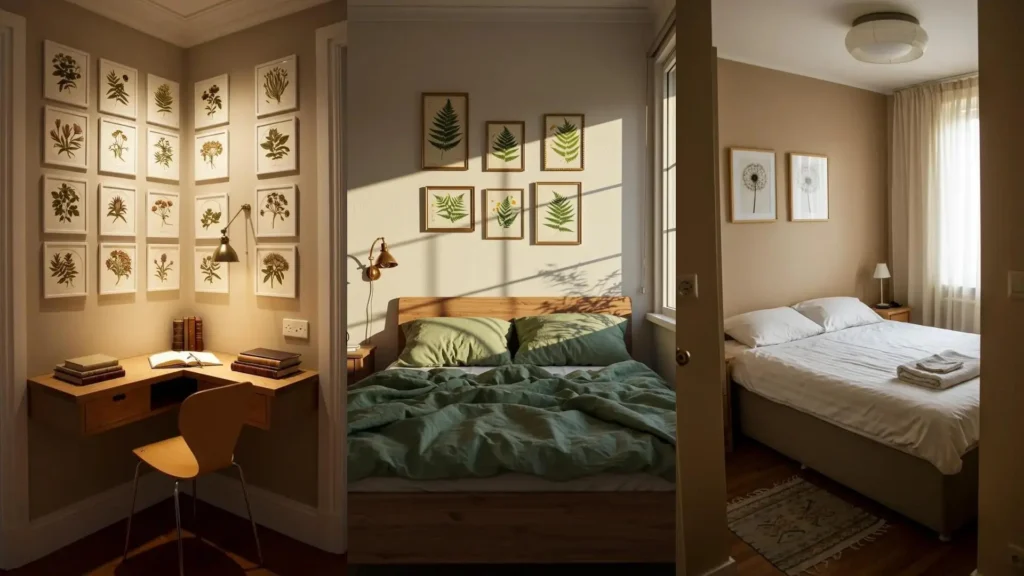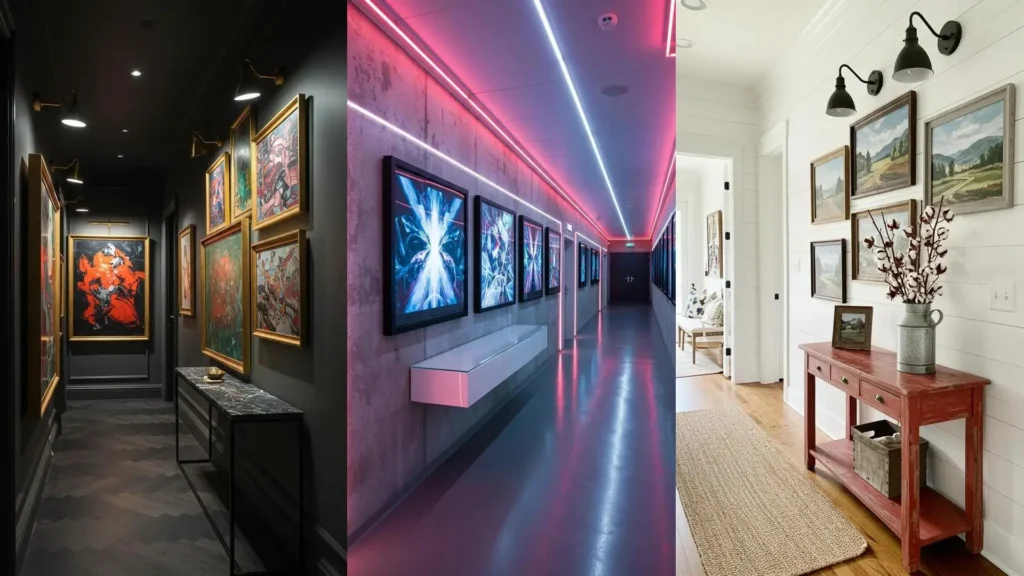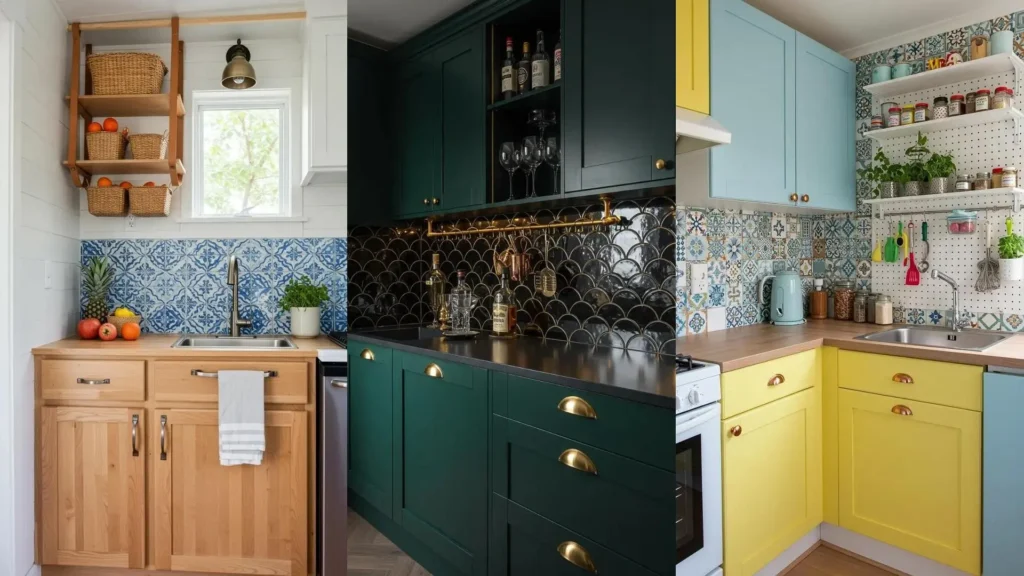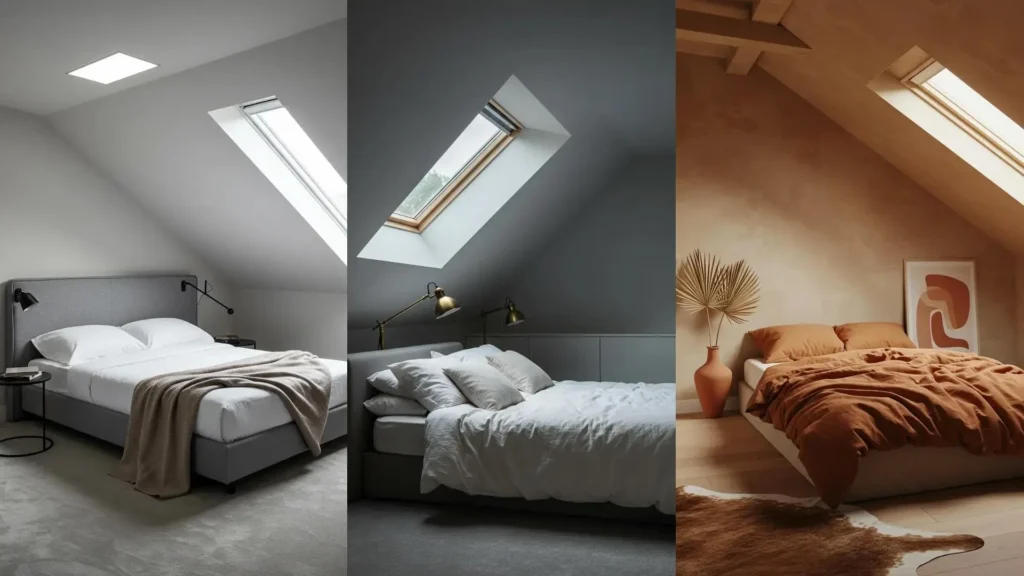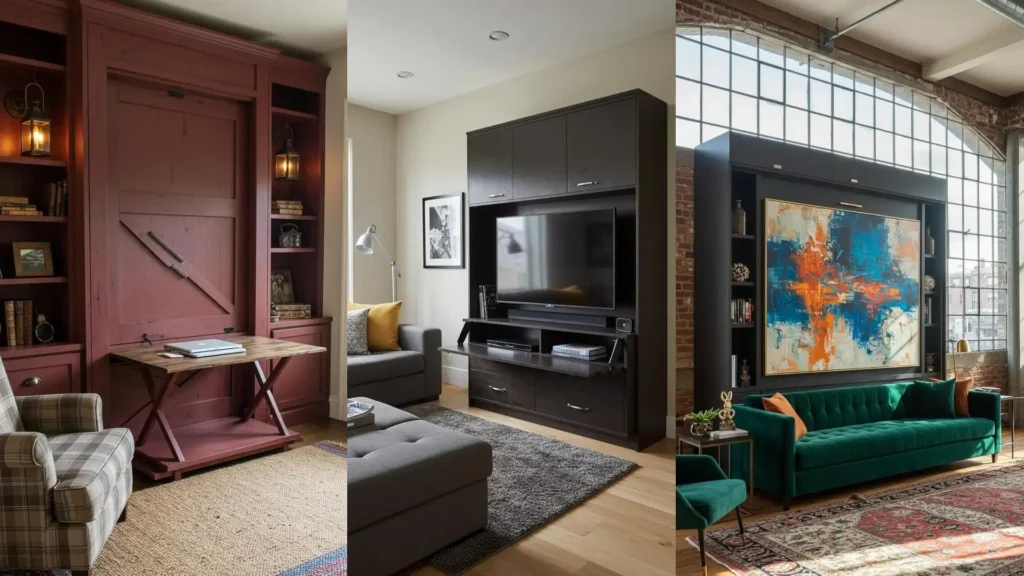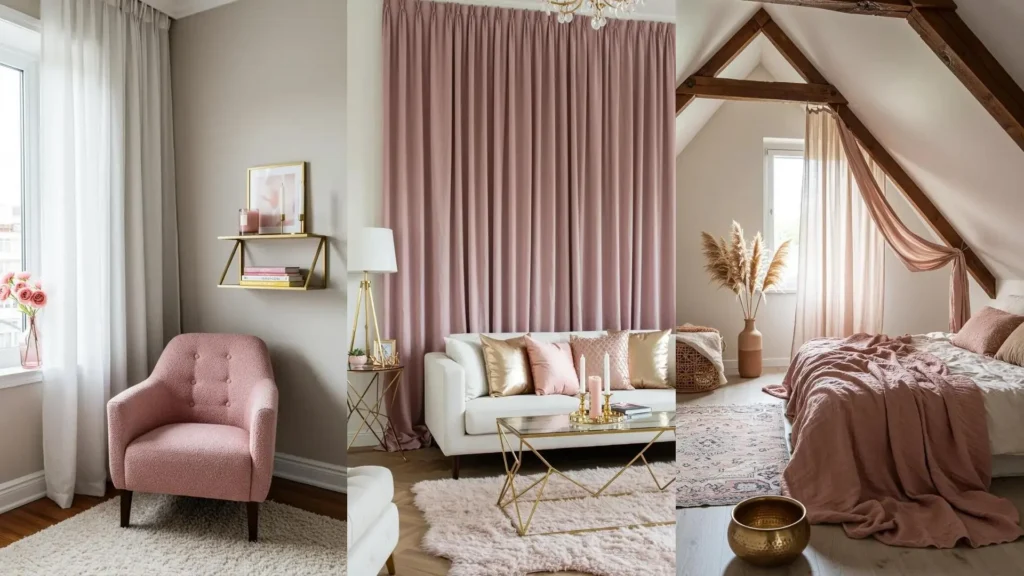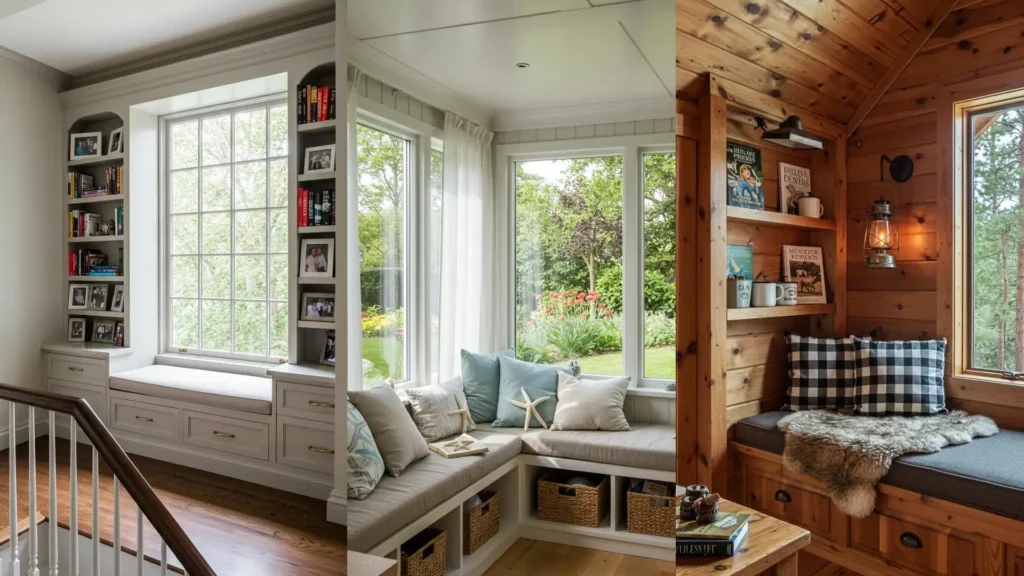When your home is small, it’s easy to feel like you’re short on options. But creating a space that feels like a true retreat—calm, personal, and beautiful—is not about size. It’s about intention.
The simplest way to transform your apartment is by harnessing two powerful elements: soft, natural light and the timeless beauty of botanical art.
This combination breathes life into any room, connecting your interior to the natural world and creating a sense of peace that is deeply restorative. Here is how you can use this pairing to make every corner of your apartment feel like a sanctuary.
1. Anchor the Room with a Single, Large-Scale Leaf
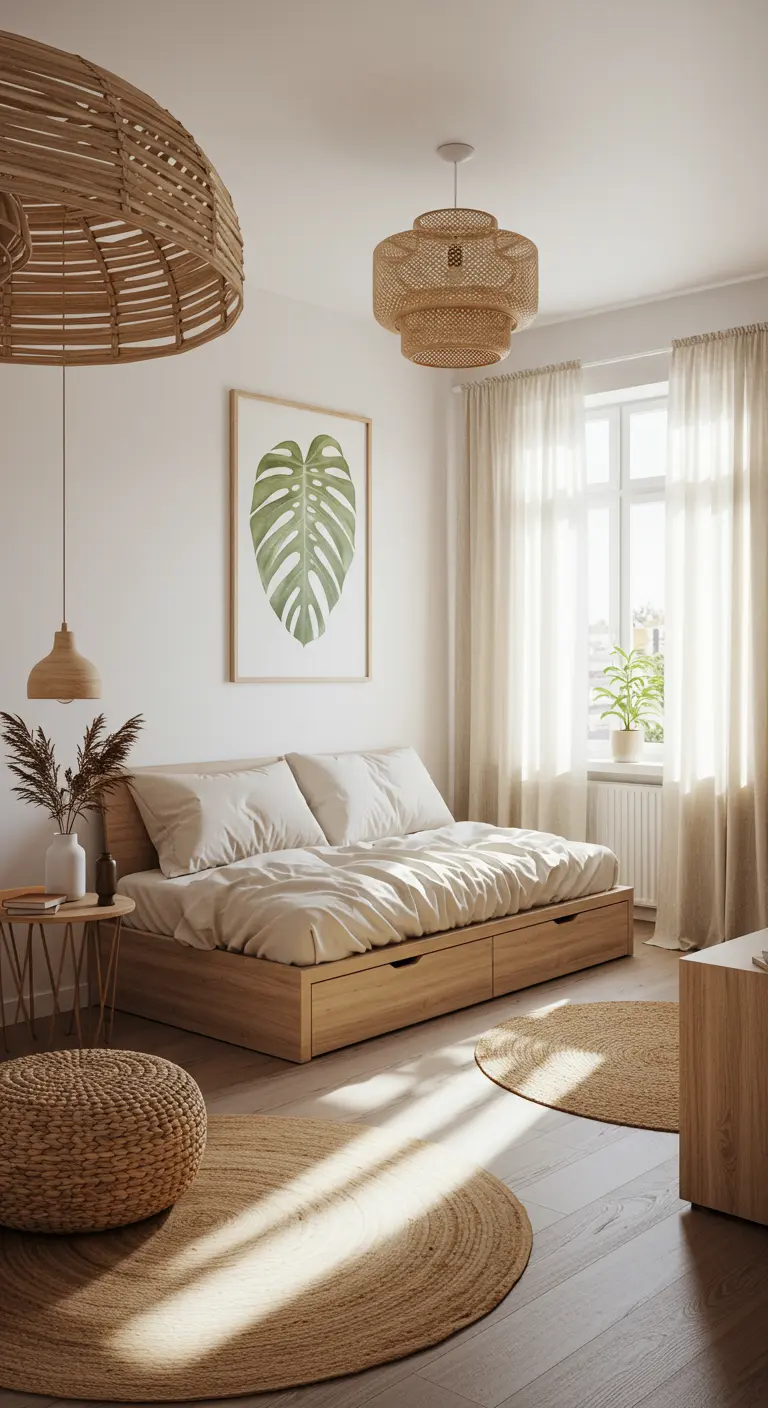
In a smaller bedroom, a single, oversized botanical print creates a powerful and uncluttered focal point.
It commands attention without overwhelming the space, unlike a busy gallery wall which can sometimes feel chaotic.
Pair it with natural materials to complete the serene feeling. Here, the light wood bed frame, woven pendant lights, and jute rugs create a cohesive, earthy palette.
This is a perfect example of how to use layered textures to add warmth and depth to a simple room.
2. Curate a Symmetrical Botanical Gallery
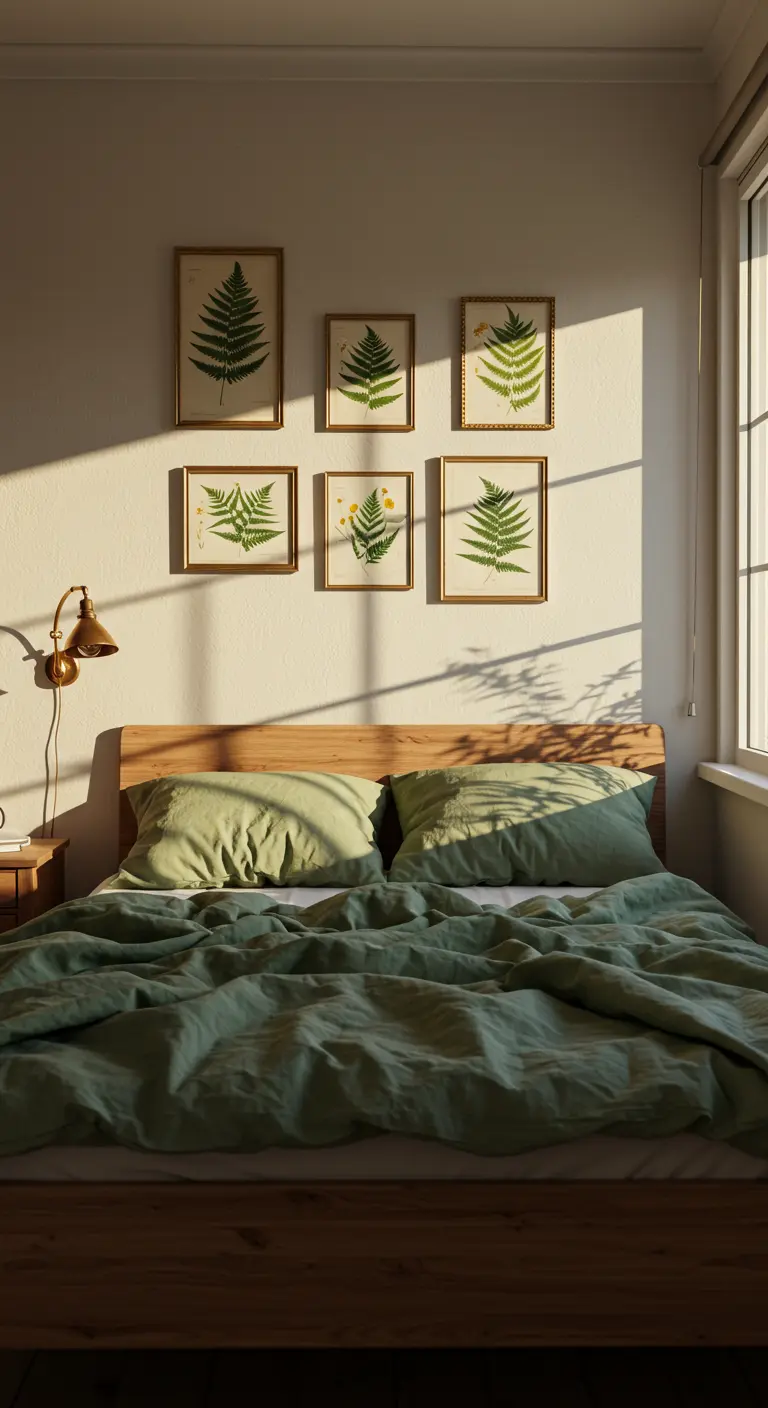
Create a sophisticated and personal feature wall by grouping a collection of smaller botanical prints.
For a calm, cohesive look, choose prints from the same family—like these various ferns—and place them in identical frames.
Arrange them in a loose grid above the headboard to ground the sleeping area. The key is to echo a color from the prints in your textiles, like the soft sage green bedding here.
This simple color link is one of the most effective sage green decor ideas for creating a harmonious space.
3. Pair Living Plants with Minimalist Line Art
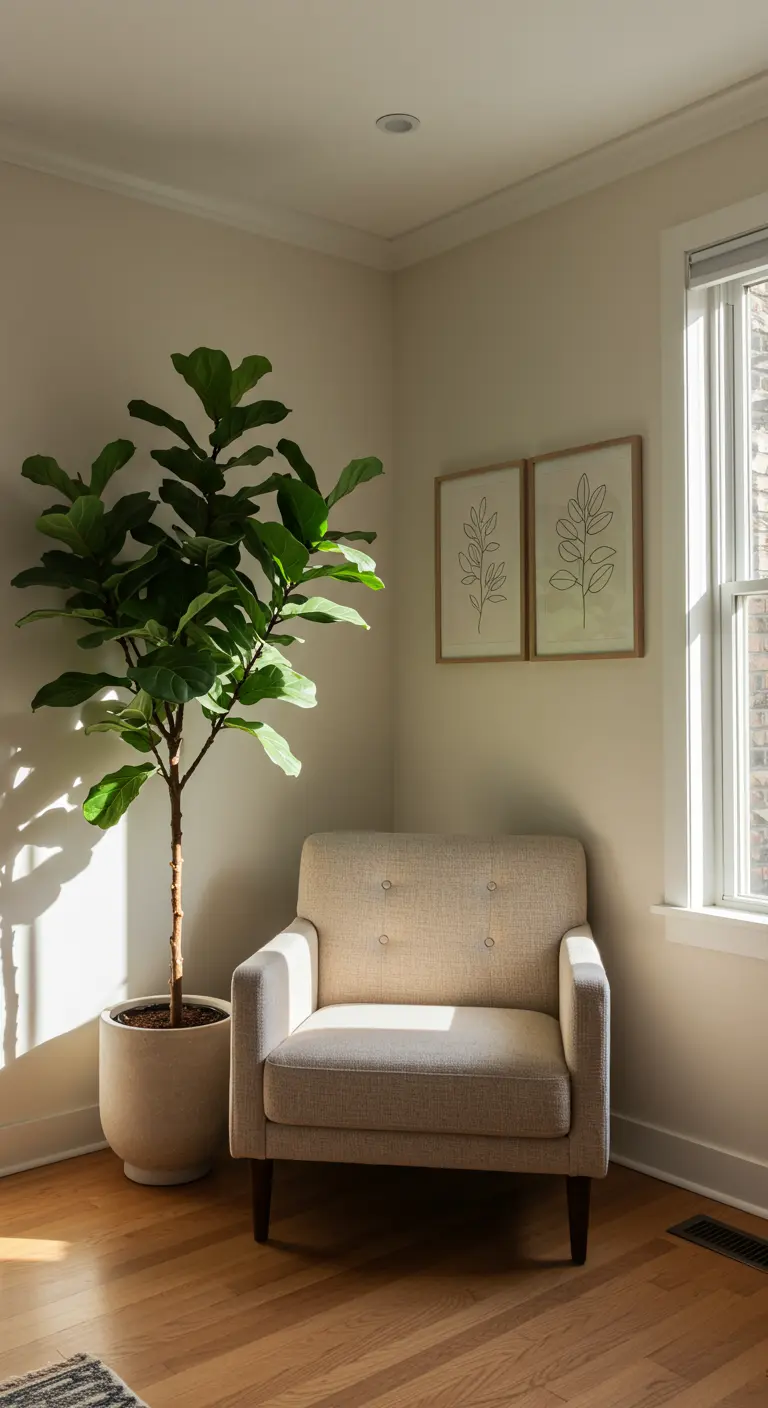
Elevate a simple corner by creating a dialogue between nature and art.
Position a tall, sculptural plant, like a fiddle-leaf fig, next to its artistic interpretation in the form of simple, framed line drawings.
This pairing adds a layer of thoughtful sophistication, celebrating the plant’s form in two different ways. It turns an empty corner into a quiet, stylish vignette.
It’s one of the best ways to create nature-inspired small spaces that feel both alive and curated.
4. Define a Dining Nook with a Collected Gallery
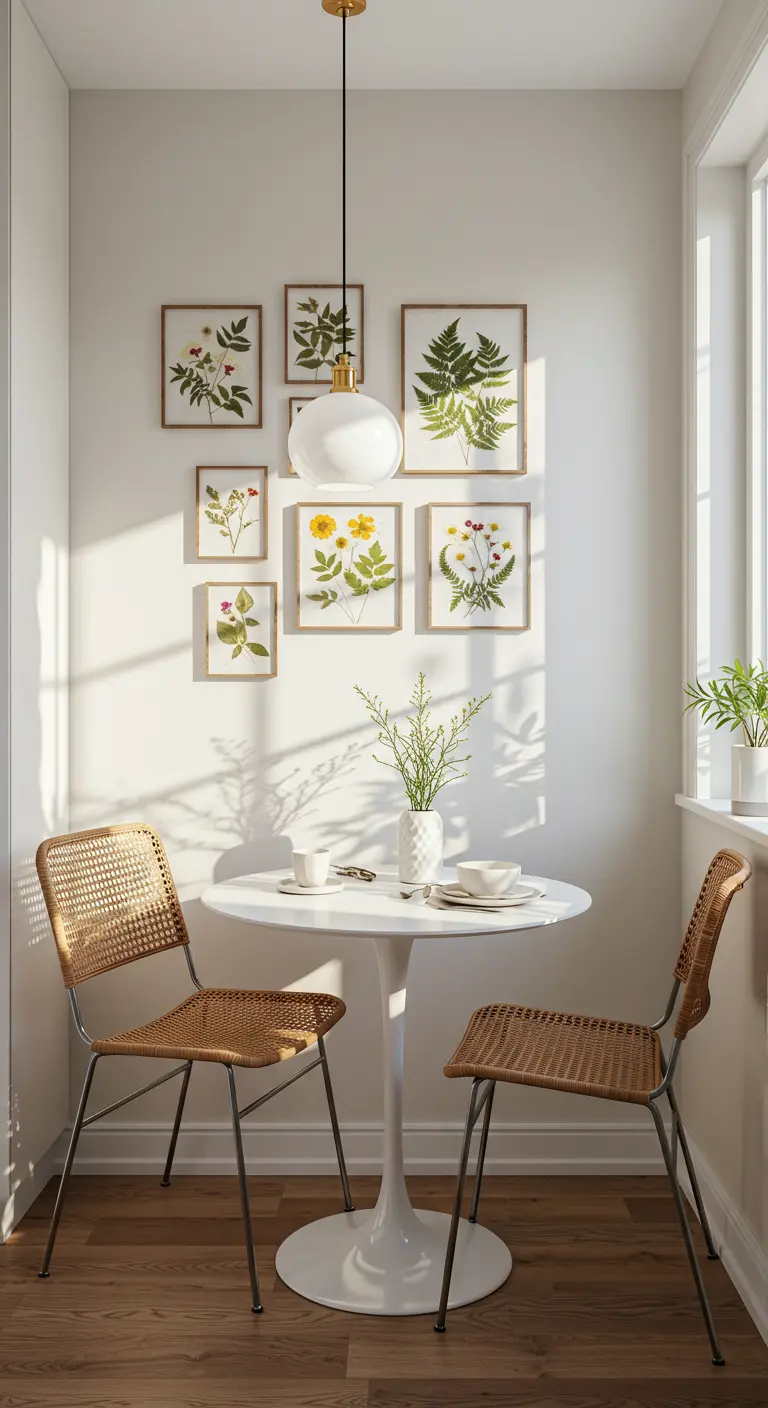
In an open-plan apartment, you can carve out a distinct dining zone using a gallery wall.
Group a collection of botanical prints to visually anchor the space and give it purpose. This technique effectively creates a ‘room within a room’.
Keep the theme consistent—like these pressed florals—but vary the sizes for a more organic feel. The woven cane chairs add texture that complements the natural art without competing with it.
For a more built-in solution, consider small dining corners with built-in banquettes to maximize seating.
5. Use a Symmetrical Grid for a Focused Workspace

For a home office, especially one tucked into a small nook, visual order is key to a clear mind.
A tight, symmetrical grid of identical prints creates a backdrop that is graphic and inspiring without being distracting.
The repetition of the bold monstera leaf pattern feels intentional and designed. Paired with a floating desk, which keeps the floor clear, the entire space feels efficient and stylish.
This is a brilliant way to transform forgotten spaces, much like how under-the-stairs nooks can become functional hubs.
6. Style a Floating Ledge for a Flexible Art Display
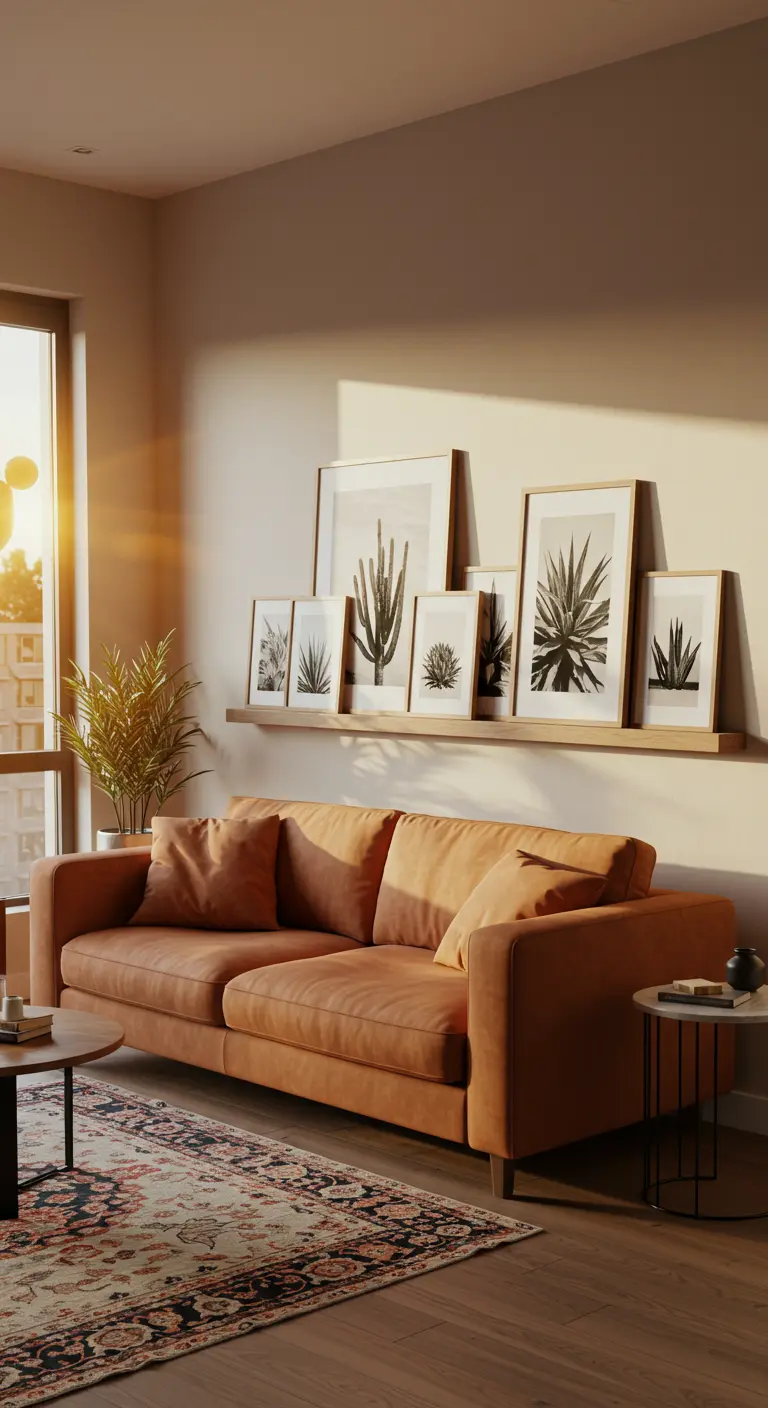
A slim picture ledge offers incredible flexibility, which is essential in a small apartment.
Instead of committing to nail holes for a full gallery, a ledge allows you to layer frames, swap prints with the seasons, and adjust your display effortlessly.
Here, a collection of desert botanical prints in varying sizes creates a relaxed, layered look above the sofa. Notice how the black and white prints are balanced by the warmth of the wood ledge and terracotta sofa.
Ledges are a signature of sleek contemporary lounges because they are both functional and chic.
7. Embrace Serenity with a Single, Meditative Piece
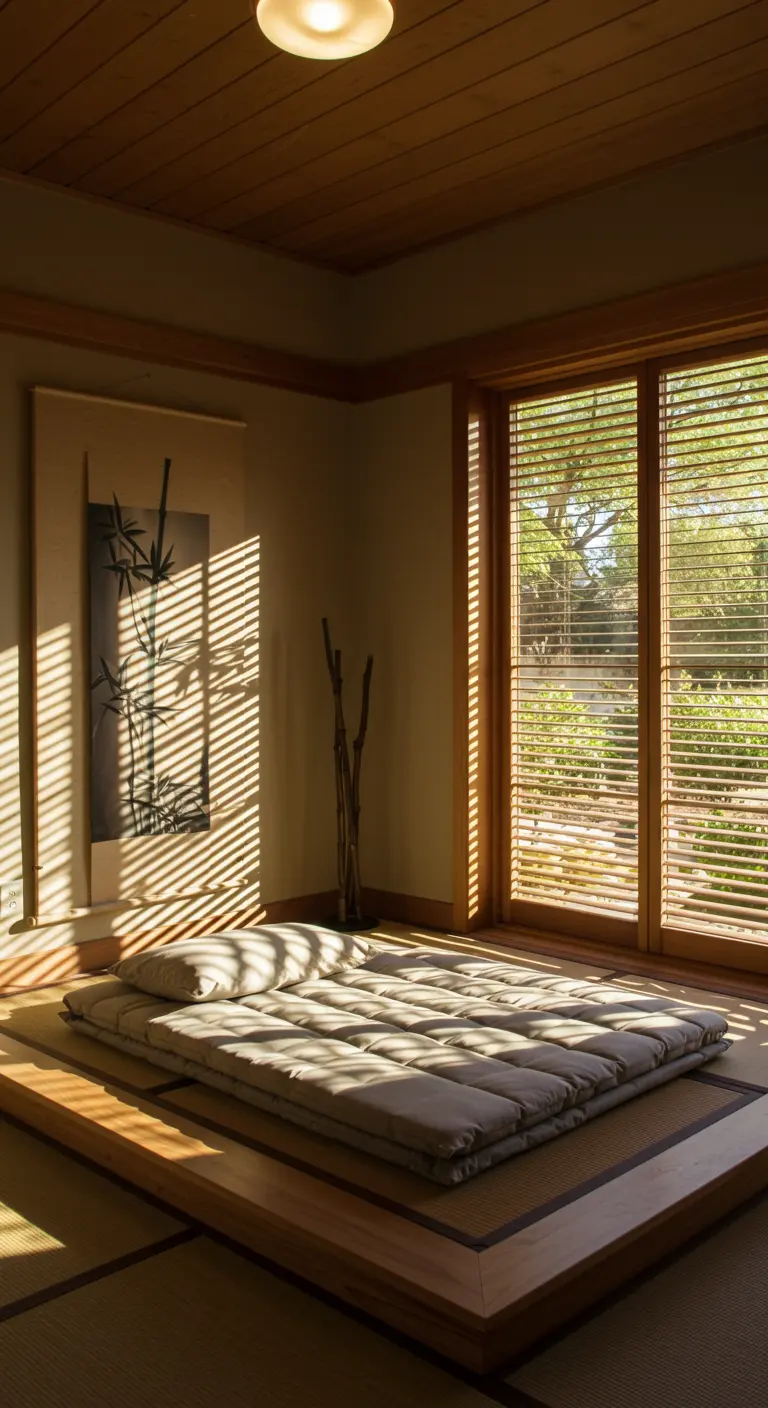
You don’t need a wall full of art to make a botanical statement. Sometimes, less is profoundly more.
In this Japanese-inspired space, a single ink-wash bamboo scroll sets a tone of deep tranquility.
The focus shifts to the interplay of light and shadow, the texture of the tatami mat, and the simplicity of the lines. This approach proves that a retreat is about feeling, not just appearance.
This ethos is the heart of Japandi decor, which blends minimalism with organic warmth.
8. Maximize Vertical Space with a Botanical Reading Nook
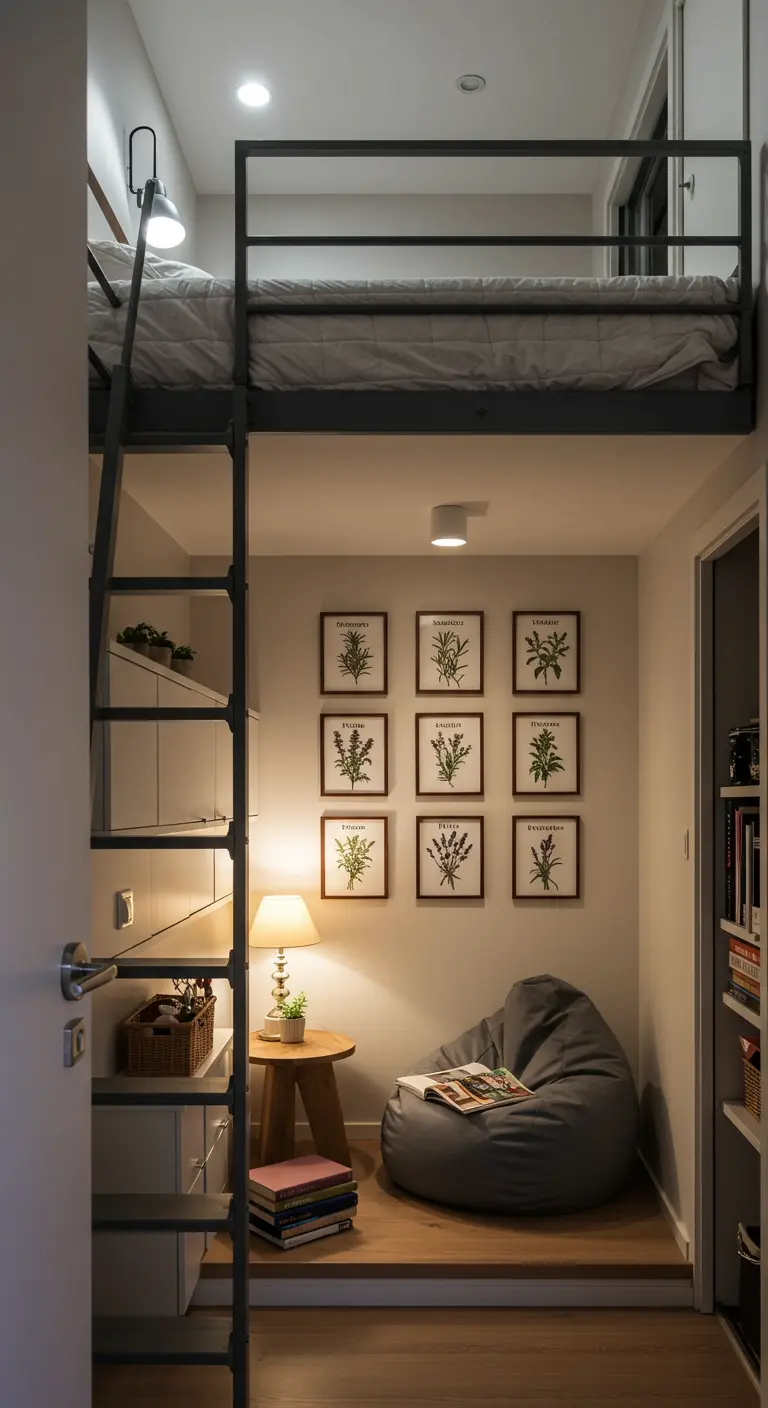
When floor space is limited, think vertically. A loft bed is a classic space-saving solution, creating a brand new zone underneath.
Define this new area and make it feel intentional with a dedicated purpose. Here, a cozy reading nook is established with a beanbag chair, a small table, and a tidy gallery wall of herb prints.
The art gives the nook its own identity, separating it from the sleeping space above. It’s one of the smartest ways to create cozy corners for small rentals.
9. Brighten Your Kitchen with Energetic Citrus Prints
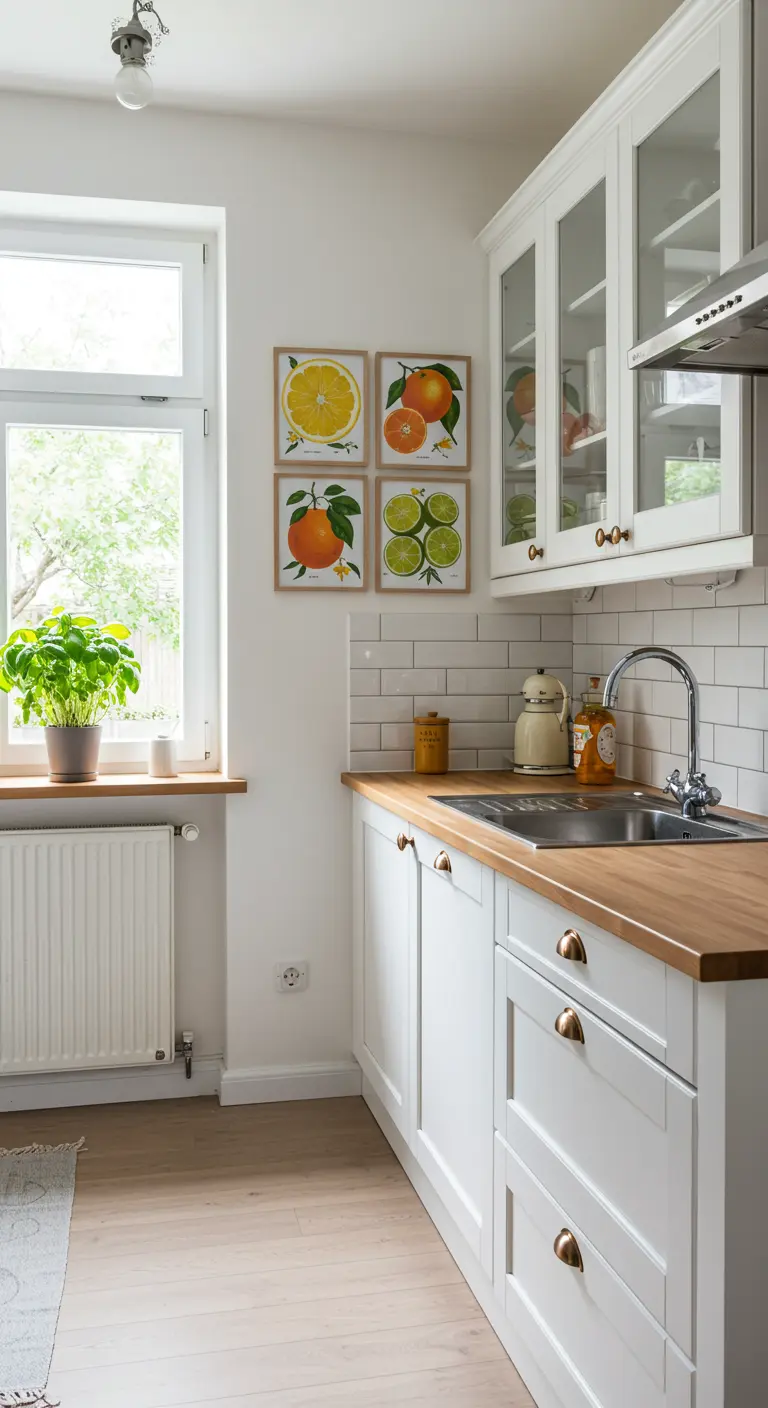
Bring a touch of freshness and color into your kitchen with art that feels connected to the space.
A simple grid of four bright citrus prints adds a cheerful, energetic vibe that is perfect for the heart of the home.
The clean white backgrounds and simple wood frames keep the look from feeling cluttered, complementing the classic white shaker cabinets and subway tile.
Even in the most functional room, there are always small kitchen decor ideas that can introduce personality.
10. Design a Spa-Like Escape with Calming Eucalyptus Art

Transform your bathroom from a purely functional room into a personal sanctuary.
The soft, gray-green tones of eucalyptus are known for their calming properties, making them an ideal subject for bathroom art.
Hanging a diptych—a pair of coordinating prints—creates a sense of balance and serenity above a clawfoot tub. The minimal presentation allows the beauty of the botanical forms to stand out.
This is a foundational step in creating spa-like bathroom retreats at home.
11. Make a Dramatic Statement with a Single, Bold Floral
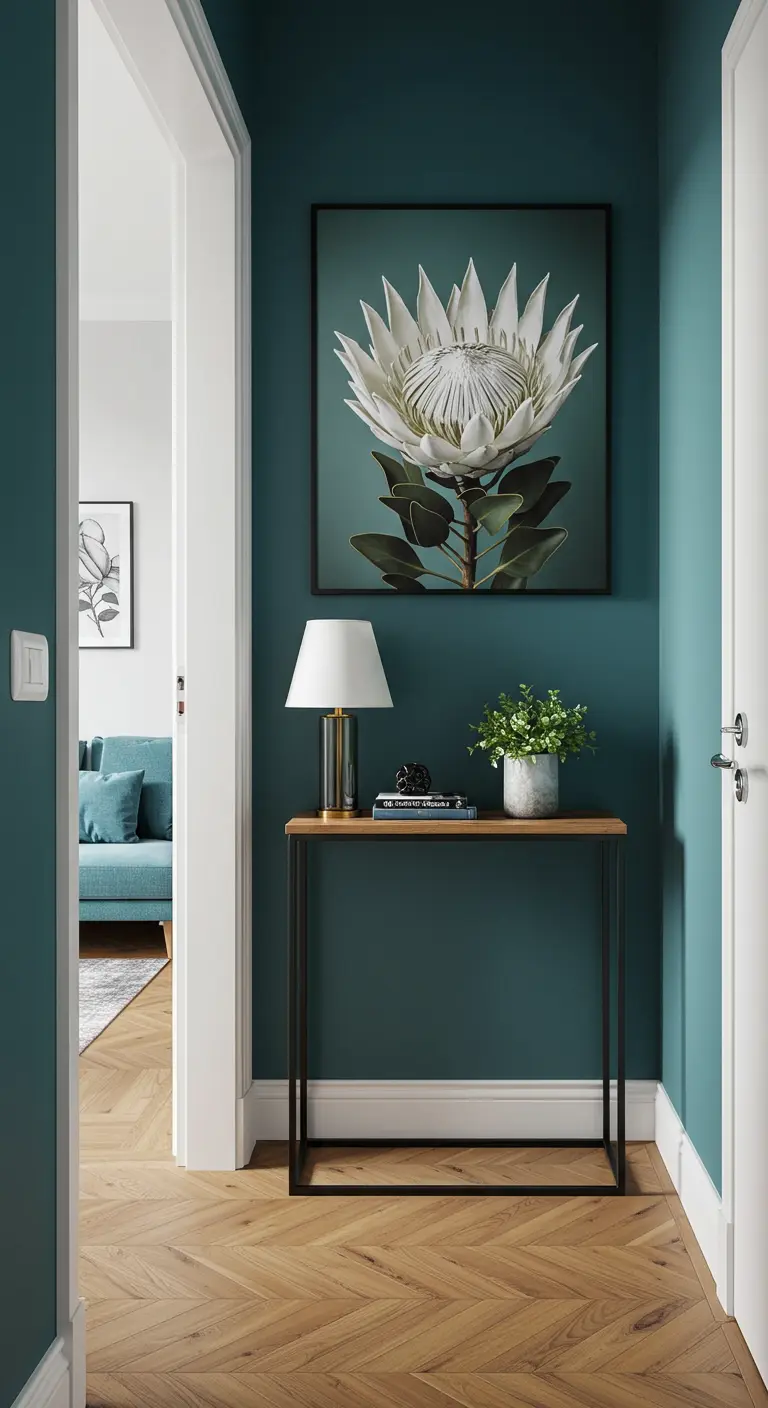
In a transitional space like a hallway, you have the opportunity to be daring.
A single, oversized piece of art, like this striking protea print, creates an immediate and unforgettable impact. Setting it against a deep, moody wall color like this rich teal enhances its drama and sophistication.
The contrast makes both the art and the wall color feel more intentional and luxurious, proving that even the smallest spaces can handle bold design choices.
This technique is a hallmark of moody interiors that feel curated and confident.
12. Cultivate an Eclectic, Floor-to-Ceiling Gallery Wall
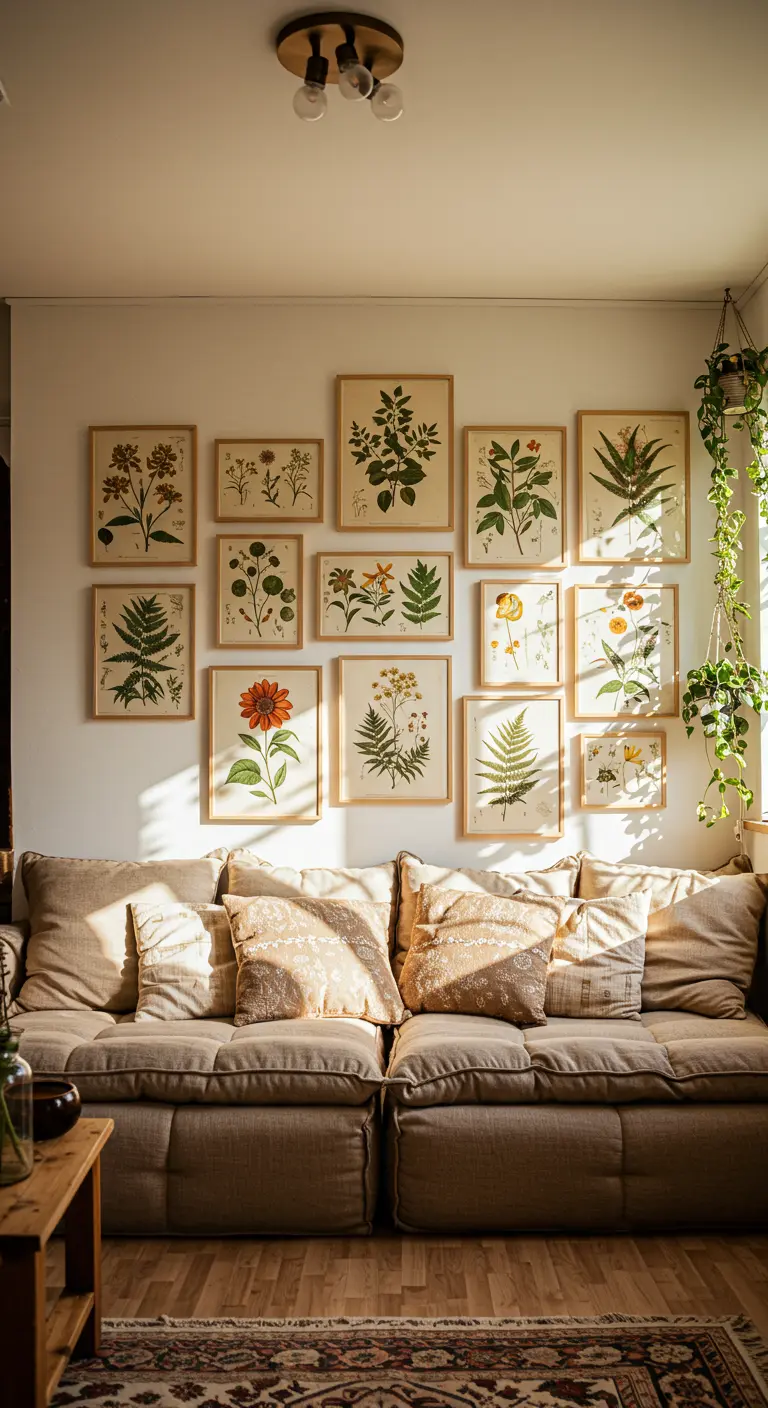
Embrace a more-is-more approach for a truly personal and expressive statement.
A large, eclectic gallery wall filled with botanical prints of all kinds—from ferns to flowers—tells a story of your personal taste.
Mix vertical and horizontal orientations and a variety of plant species, but create cohesion by using frames of the same color and style. Let it grow over time by adding new pieces you love.
There are many inspiring gallery wall layouts, but the most important thing is that it reflects you.
13. Evoke Atmosphere with a Moody Forest Landscape
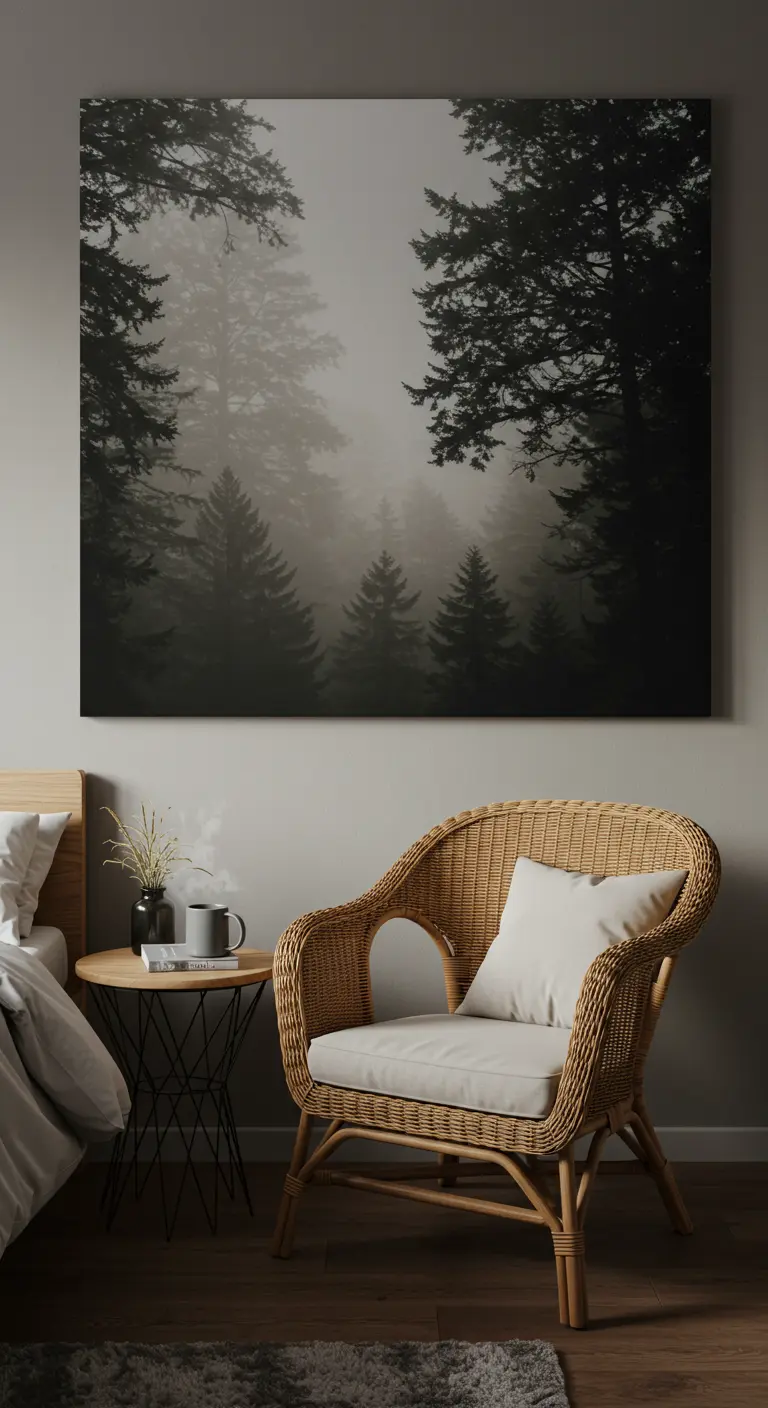
Botanical art isn’t limited to illustrations of single leaves or flowers; it can also be about capturing a feeling.
A large, atmospheric canvas of a misty forest transports you to another place, creating a powerful sense of escape and tranquility within your own home.
The moody, monochromatic palette is sophisticated and calming. To keep it from feeling cold, ground the look with warm, natural textures like the woven rattan chair.
This creates the feeling of one of those romantic, enchanted forest bedroom spaces.
14. Use Botanical Wallpaper for Seamless, Space-Saving Style
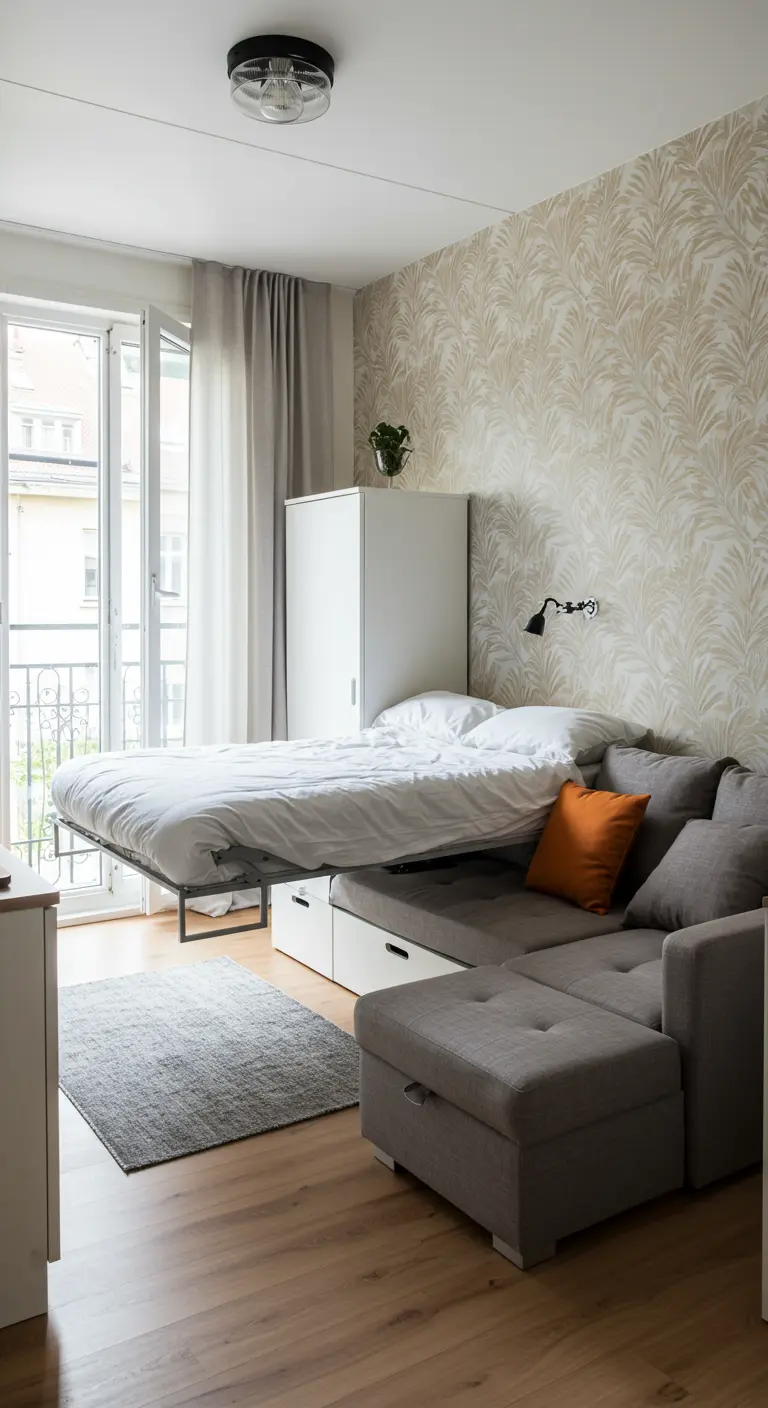
In a studio or a room that serves multiple functions, wallpaper is your best friend.
Here, a subtle, tone-on-tone leaf-patterned wallpaper on an accent wall adds texture and depth without overwhelming the space. It acts as a beautiful headboard when the murphy bed is down and a stylish feature wall when it’s up.
This creates a cohesive look that works with flexible furniture layouts, ensuring the room always feels complete.
15. Introduce Graphic Contrast with Monochrome Leaves
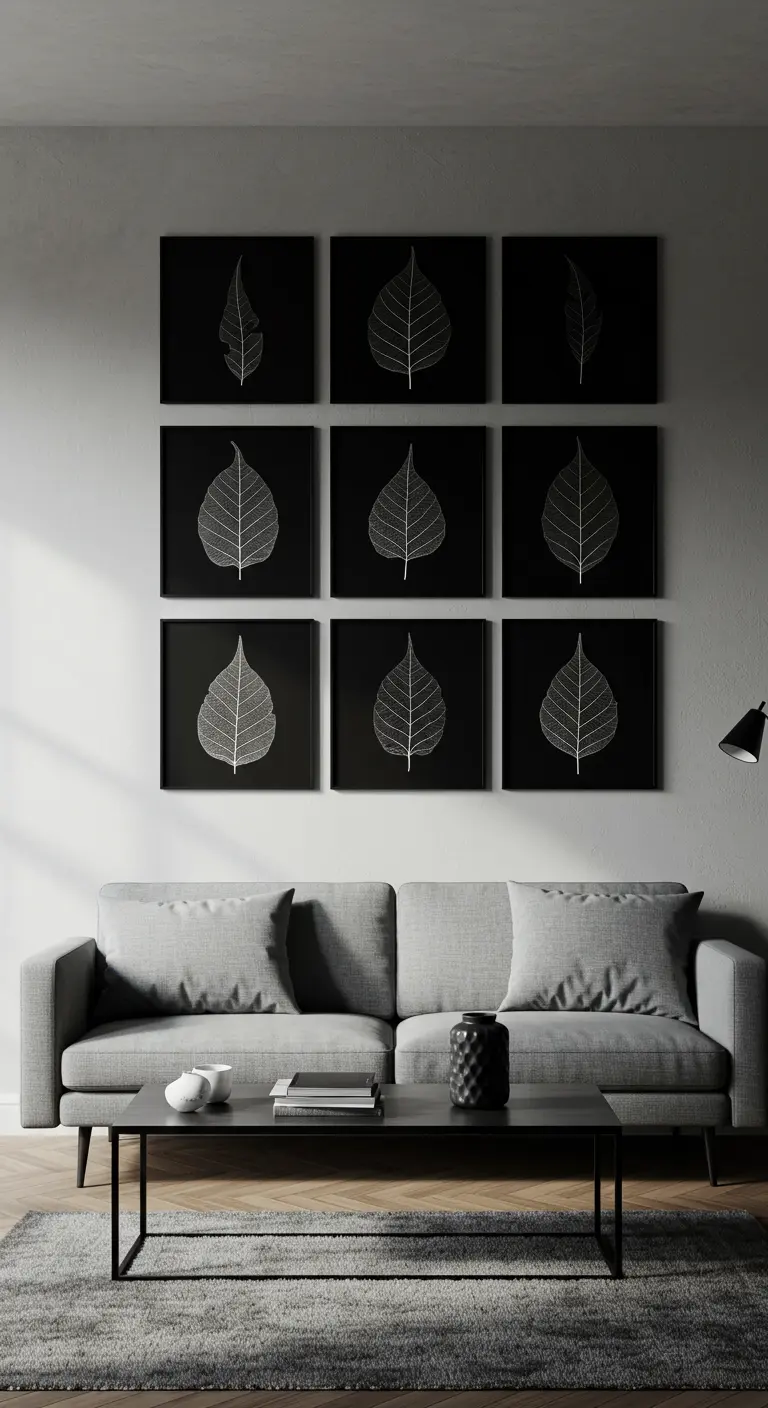
For a modern, sophisticated take on the botanical trend, remove color from the equation.
This grid of nine skeleton leaf prints is striking and graphic, reading almost as abstract art from a distance. The high contrast between the delicate white veins and the stark black background is incredibly chic.
This style works beautifully in a minimalist or monochrome gray interior, adding a natural element that feels sharp and contemporary.
16. Soften a Neutral Room with Delicate Dandelion Prints
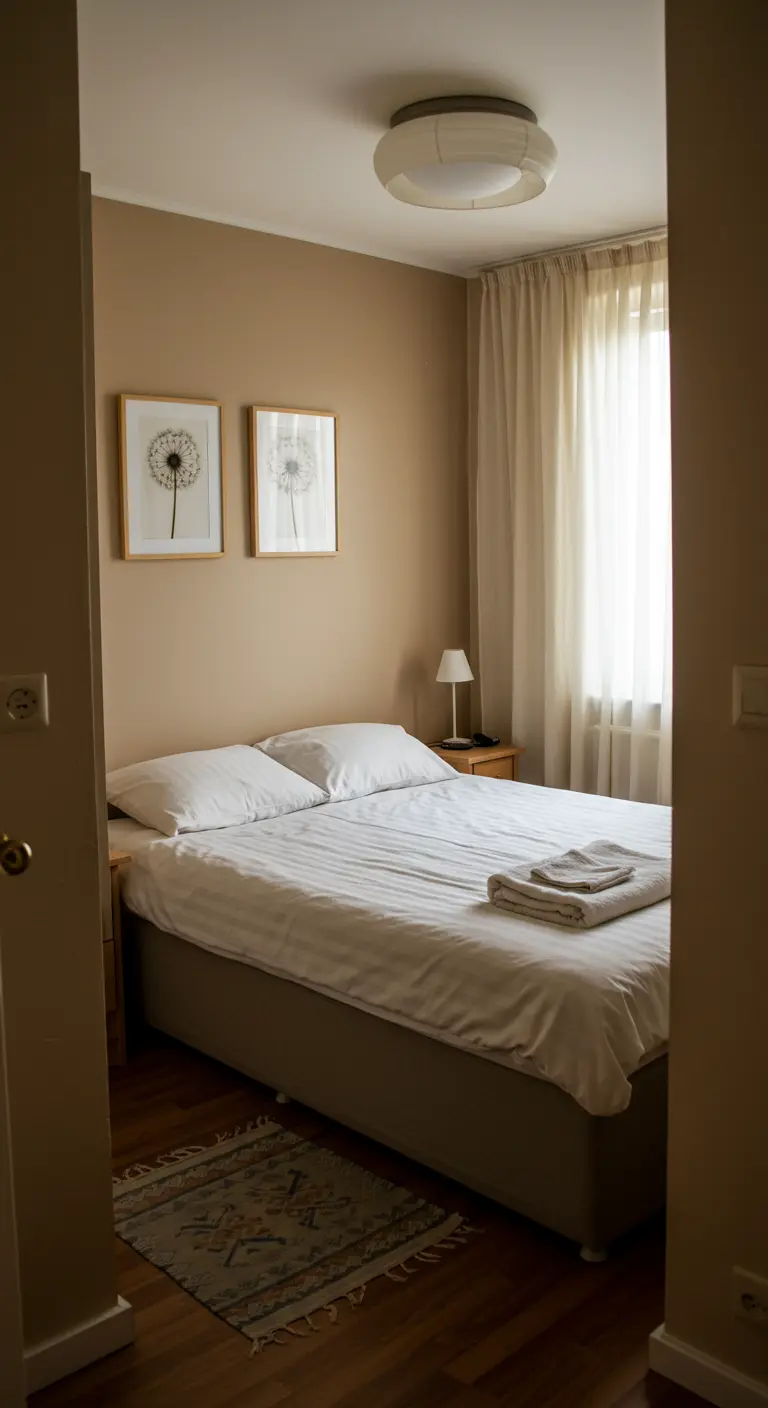
Botanical art can be powerful and bold, but it can also be quiet and gentle.
In this serene bedroom, a pair of delicate dandelion prints adds a touch of airy whimsy without disrupting the calm, neutral color palette.
The fine lines and ample white space within the prints contribute to the room’s light and uncluttered feel. This is a perfect choice for creating a restful atmosphere.
It’s a beautiful example of how to execute elegant neutral palettes with a hint of personality.
17. Integrate Art Directly with a Vegetable-Themed Backsplash
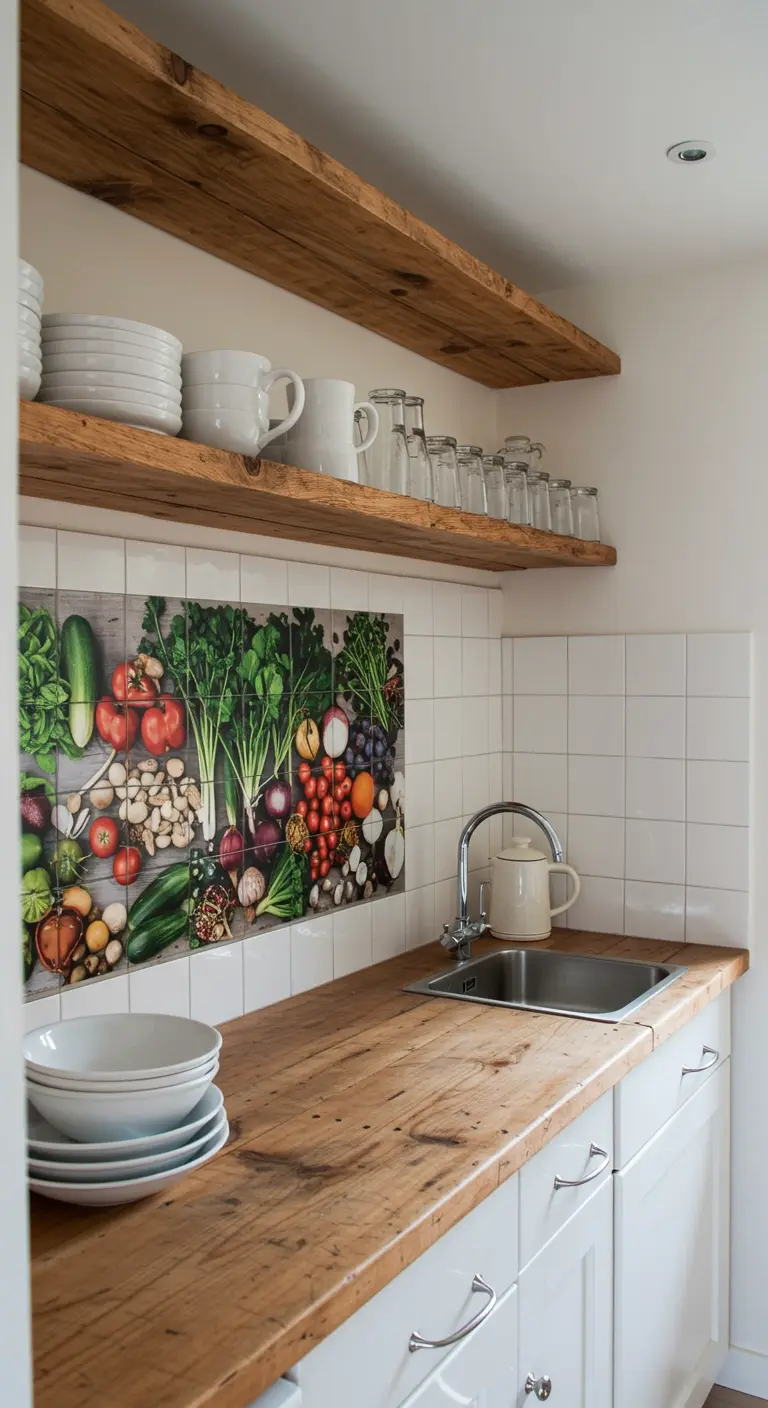
In a kitchen, why not make your art both beautiful and functional?
A tile mural backsplash is a clever way to introduce a permanent botanical element. This vibrant vegetable illustration adds immense charm and personality to an otherwise simple kitchen.
It’s durable, waterproof, and easy to clean—far more practical than a framed print behind a sink. It’s a wonderful example of statement tile backsplash kitchens that blend art with utility.
18. Layer Prints and Plants for a Living Gallery Wall
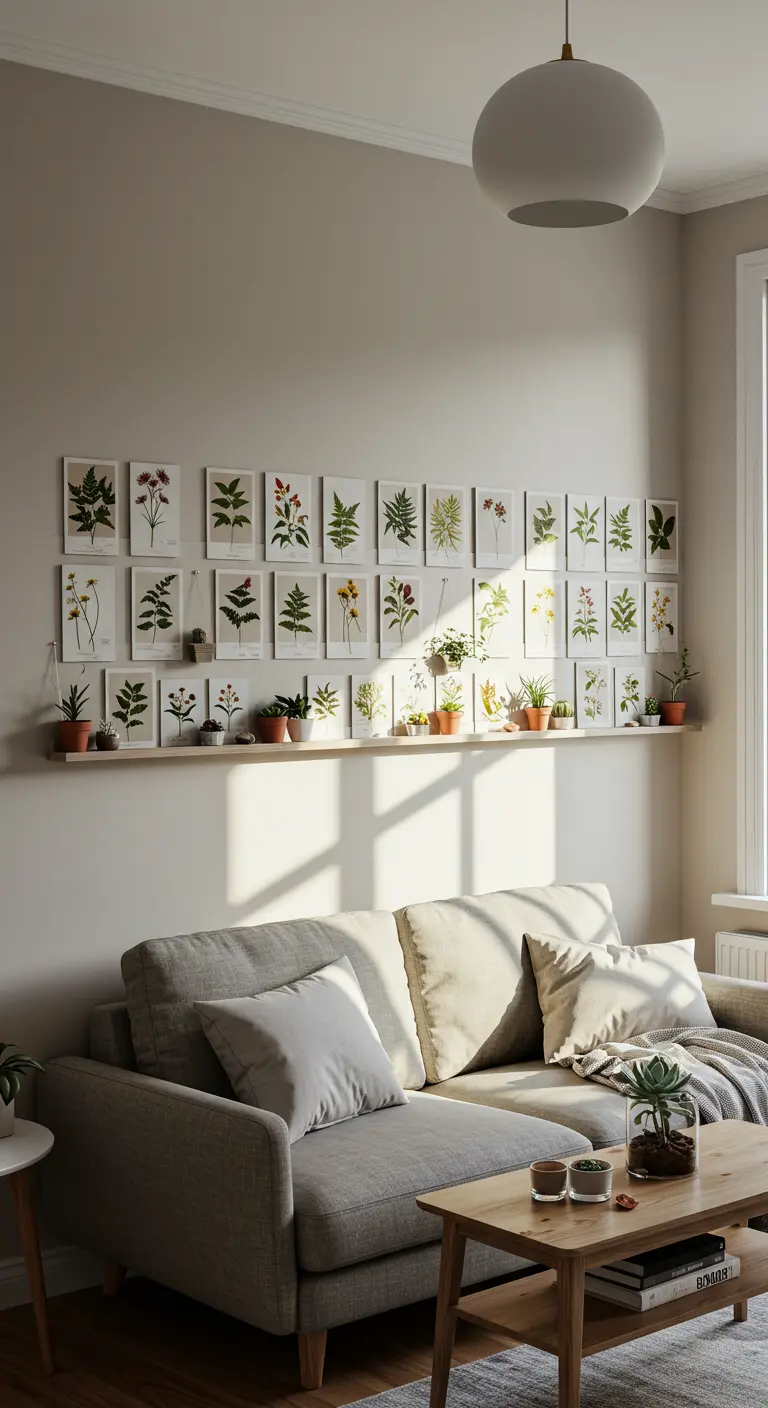
Create a display that feels truly alive by blurring the lines between art and nature.
Use a long picture ledge to showcase a mix of framed botanical prints and small, live potted plants. The three-dimensional quality of the plants adds depth and vitality to the arrangement.
This approach allows you to easily rotate both your art and your greenery, keeping the display fresh and evolving. It’s a key principle in designing green-infused kitchens and living spaces.
19. Make a Graphic Impact with an Oversized Diptych
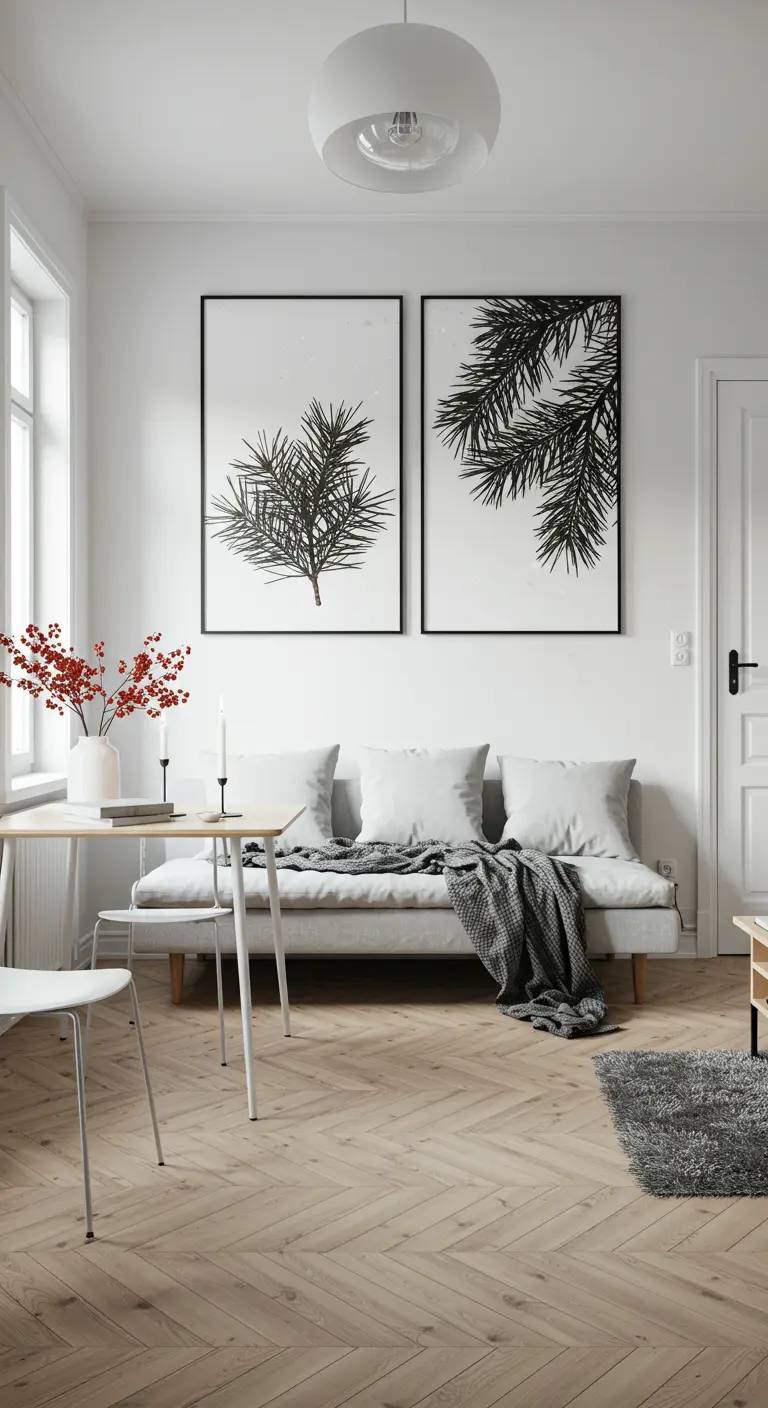
For a clean, contemporary statement, split a single image across two large frames.
This diptych of a pine branch feels bold and expansive, drawing the eye across the wall and making the artwork a major architectural feature of the room.
The sharp, graphic quality of the dark needles against the stark white background is a perfect fit for a minimalist Scandinavian interior, adding a touch of nature without any clutter.
20. Create a Magical Surprise with Luminous Botanical Art
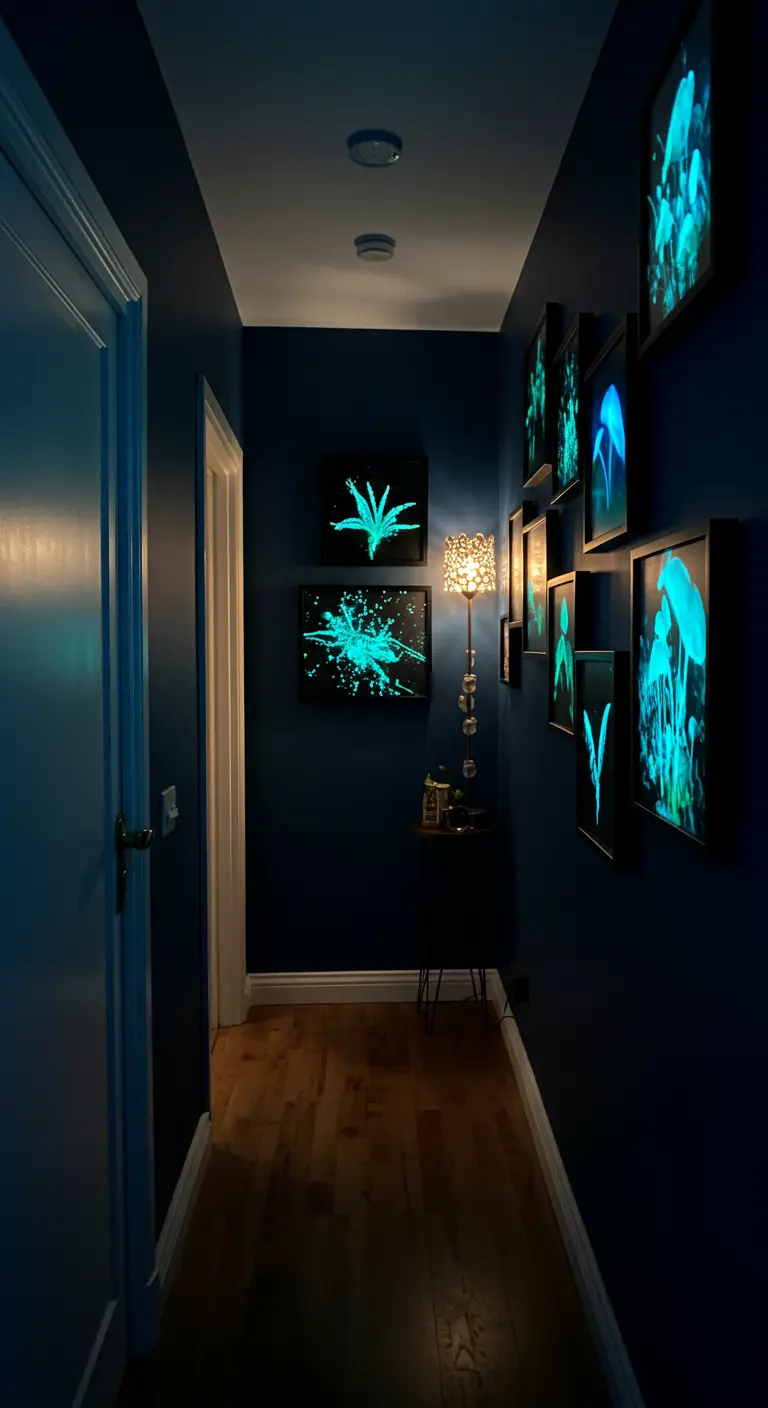
Introduce an element of wonder into your home with art that has a secret.
This gallery wall in a dark hallway features prints that glow with a soft, luminous light. During the day, they are intriguing botanical images; at night, they transform the space into a magical, immersive experience.
This is a particularly effective technique for interior hallways or moody small spaces that don’t get much natural light, adding its own source of ambient glow.
21. Use the Space Between Windows for a Cheerful Accent
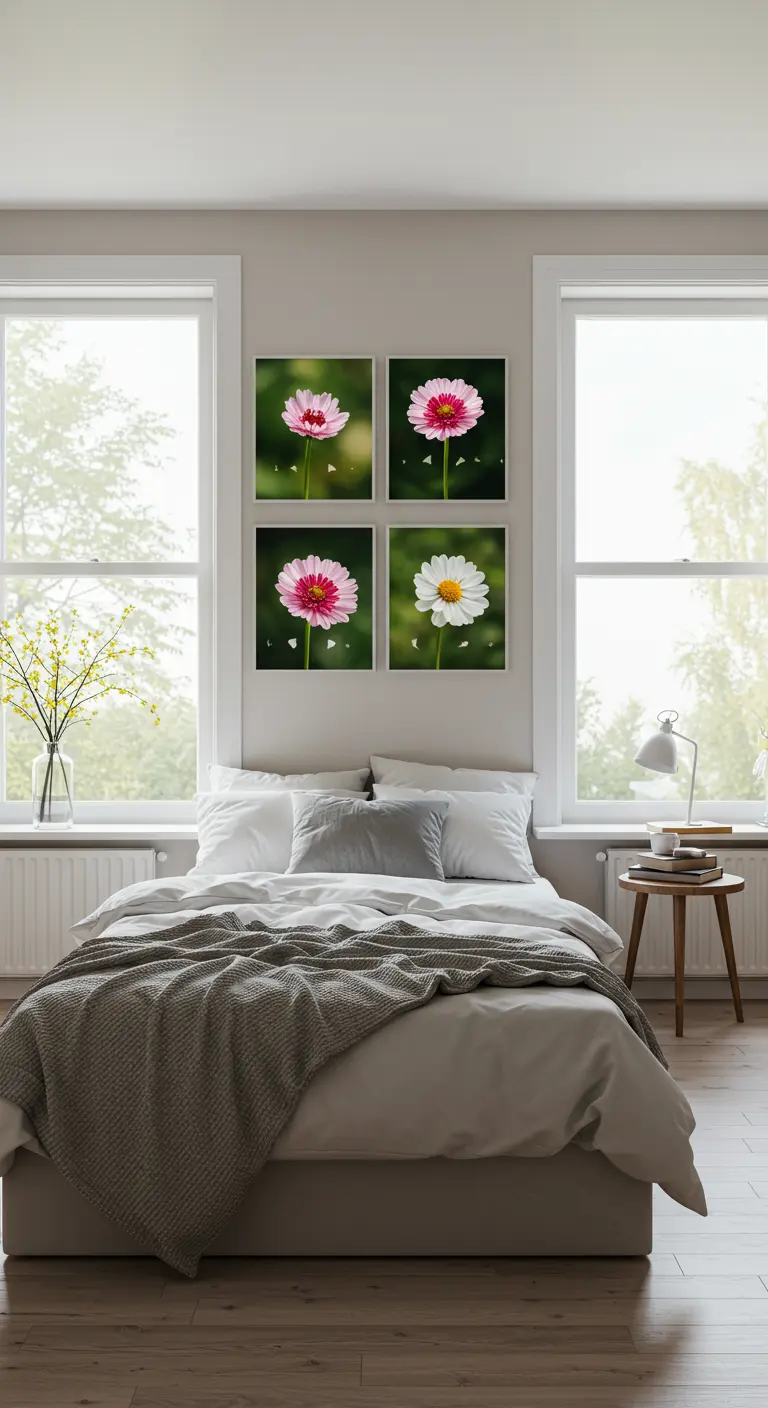
The vertical slice of wall between two windows is prime real estate for art.
This symmetrical placement creates a natural focal point and brings balance to the room. Here, a tight grid of four vibrant floral prints adds a concentrated pop of color that instantly lifts the space.
It’s an excellent strategy to add personality without competing with the view, making the room feel like one of those fresh, spring-inspired living rooms year-round.
22. Define Your Space with Artistic Shoji Screen Dividers
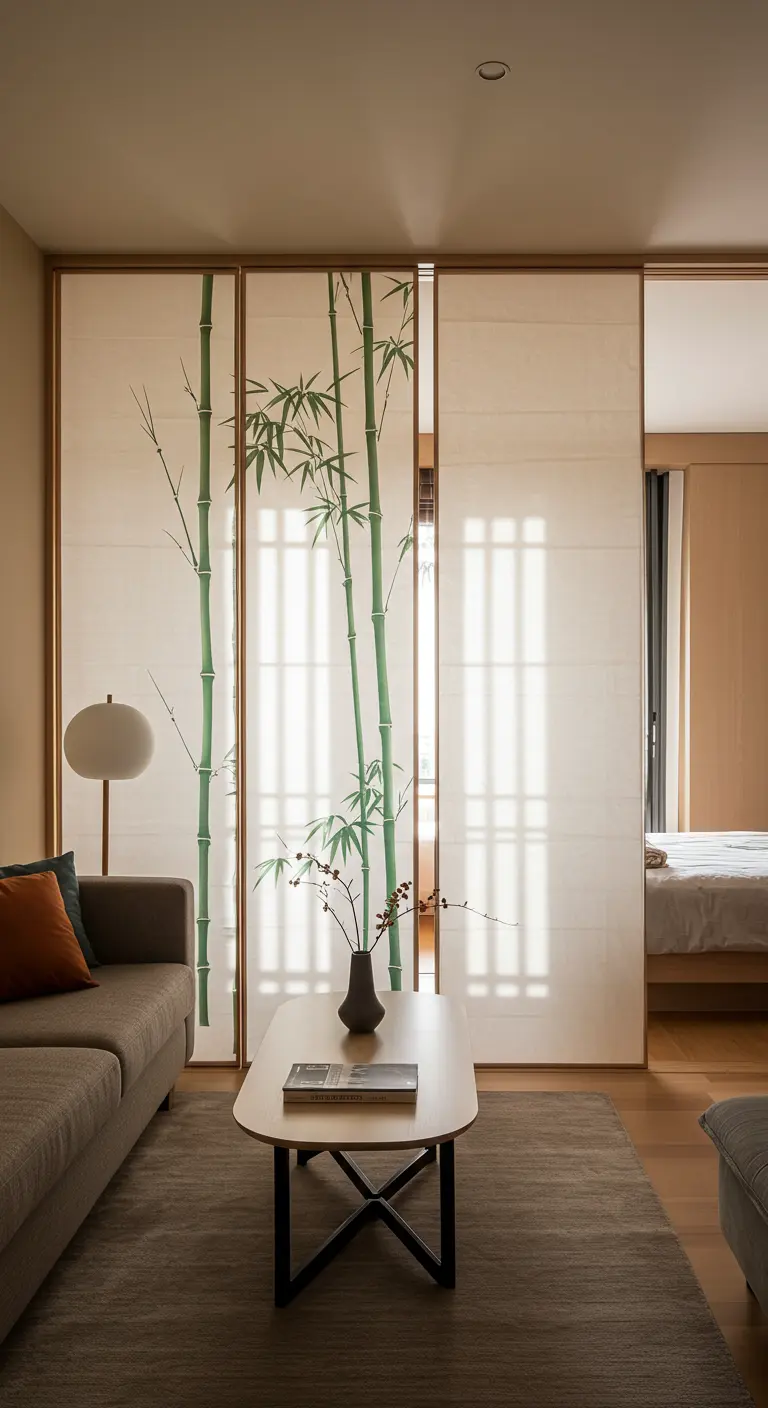
In an open-plan apartment, creating distinct zones is crucial for a sense of order and peace.
Instead of a solid wall, consider functional art like these Japanese-style shoji screens. The painted bamboo motif adds a beautiful, organic element while the translucent paper allows light to filter through, maintaining an airy feel.
They elegantly separate the living and sleeping areas, serving as a movable wall and a piece of art in one. It’s a key feature in contemporary Zen homes.
23. Design a Breezy Reading Corner with Coastal Flora
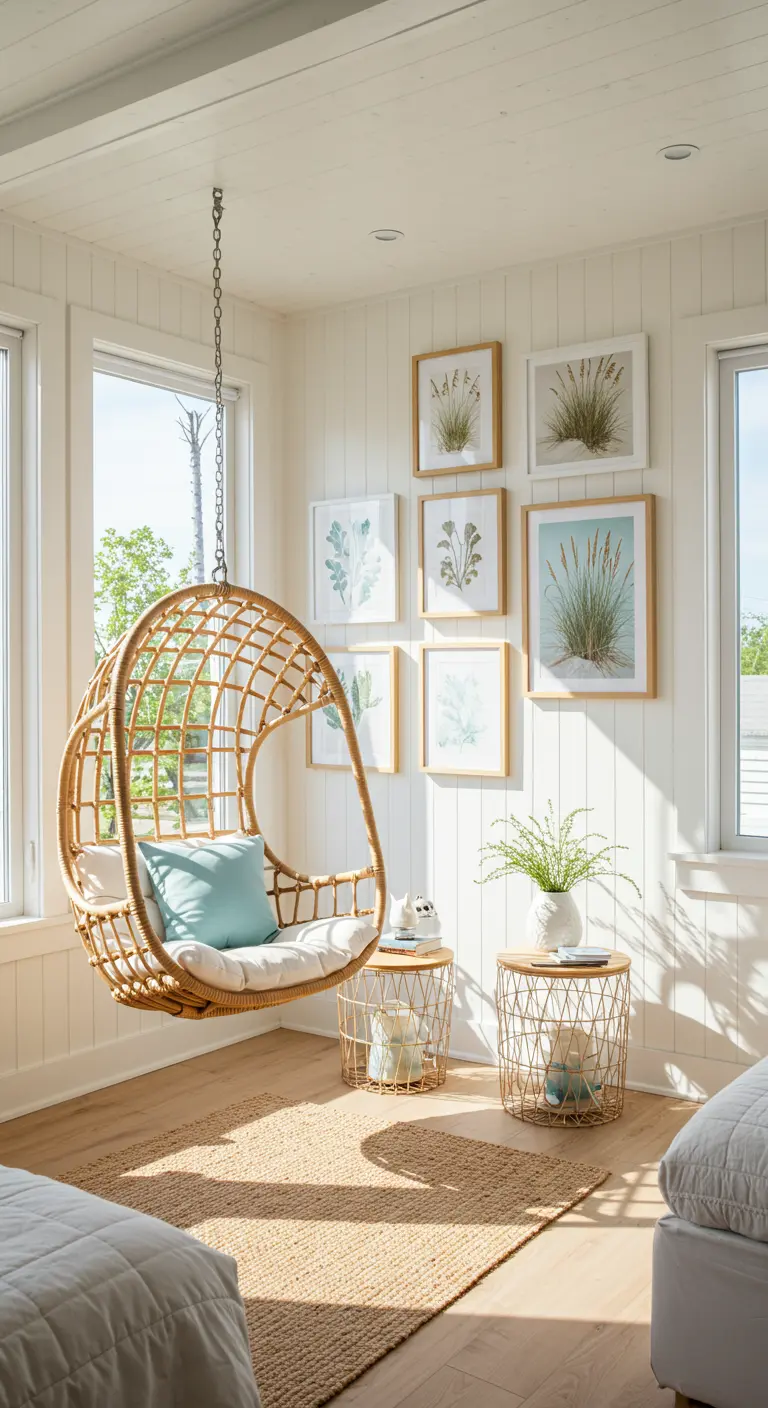
Capture the relaxed feeling of a seaside cottage, no matter where you live.
Pair a quintessential piece of casual furniture, like a hanging rattan chair, with a gallery wall of coastal plants and beach grasses. The light wood frames and soft, muted colors in the prints enhance the natural light.
A natural fiber rug, like the jute one here, completes the look, grounding the space in texture. This is the essence of timeless coastal chic.
24. Wrap a Corner with a Vintage Botanical Study
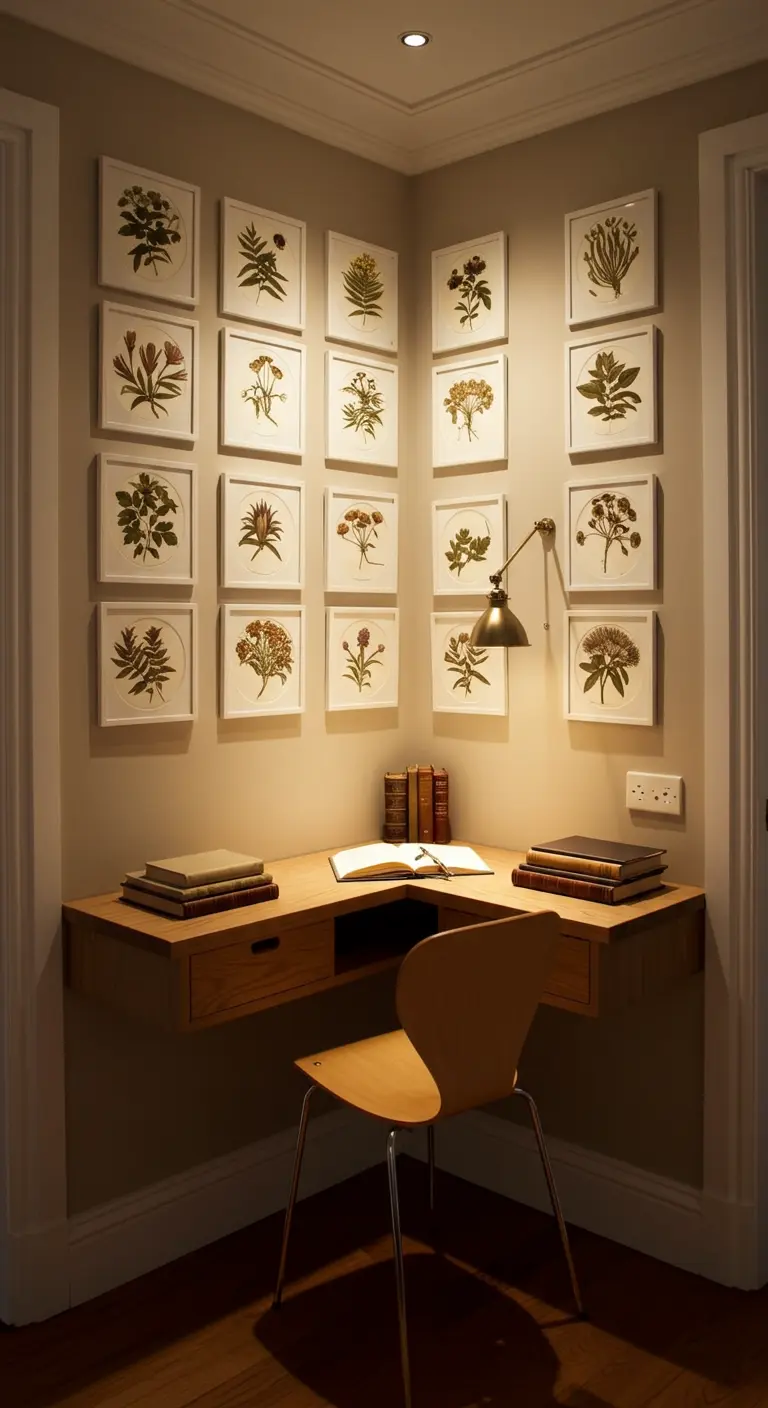
Transform a simple desk into an immersive workspace by wrapping the corner walls in art.
A dense arrangement of vintage-style botanical prints creates the feeling of a classic herbarium or a naturalist’s study. The repetition of the same size and frame style gives it a collected, intentional look.
This technique makes a small corner feel significant and inspiring—almost like a tiny, enchanted library dedicated to the natural world.
25. Soften a Bedroom with a High-Impact Botanical Tapestry
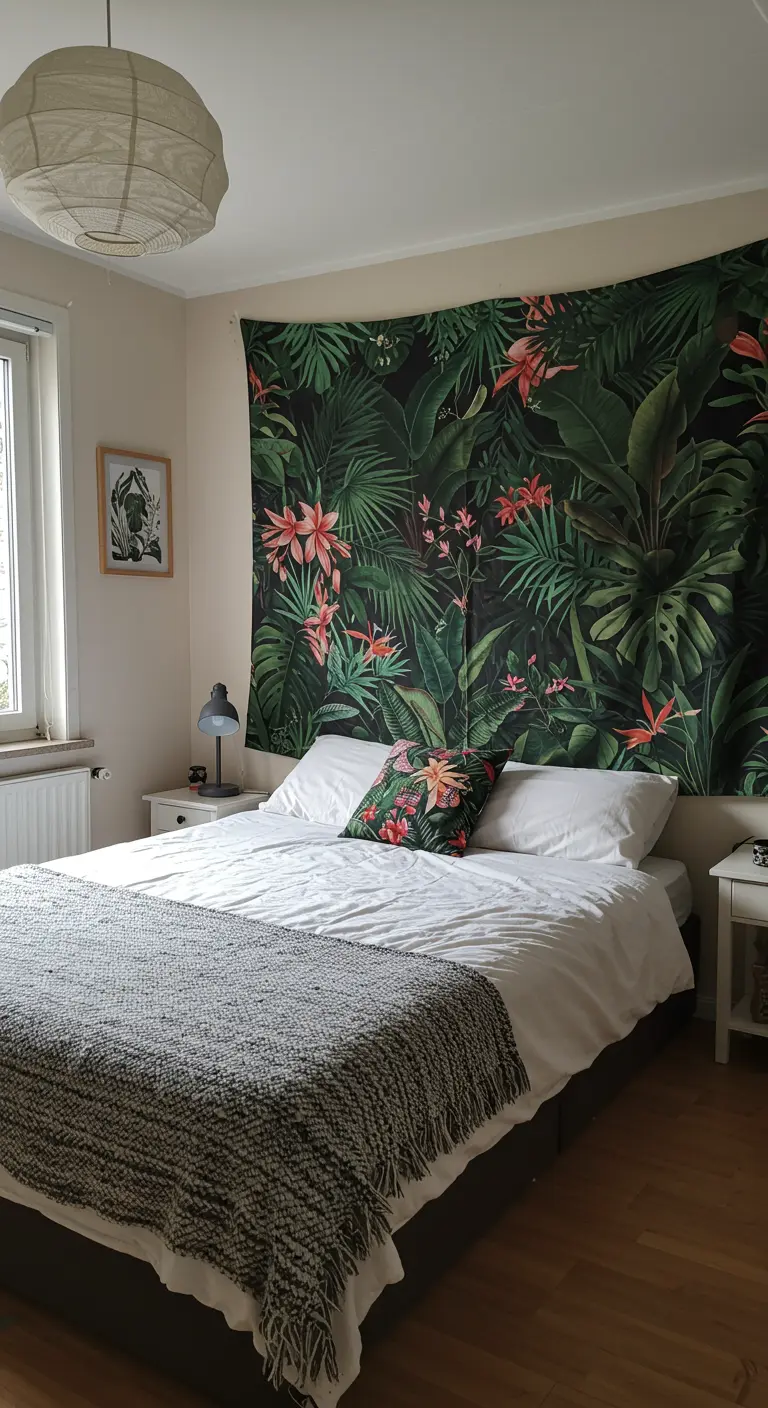
For a bold statement that also adds softness and absorbs sound, a fabric tapestry is an excellent choice.
Hung behind the bed, it serves as a dramatic, oversized headboard. A lush, tropical print like this instantly evokes a sense of escape and vacation.
This is a fantastic option for renters, as it creates a massive impact with minimal damage to walls. It’s a key element in many urban jungle bedroom designs.
26. Double Your Art’s Impact with a Well-Placed Mirror
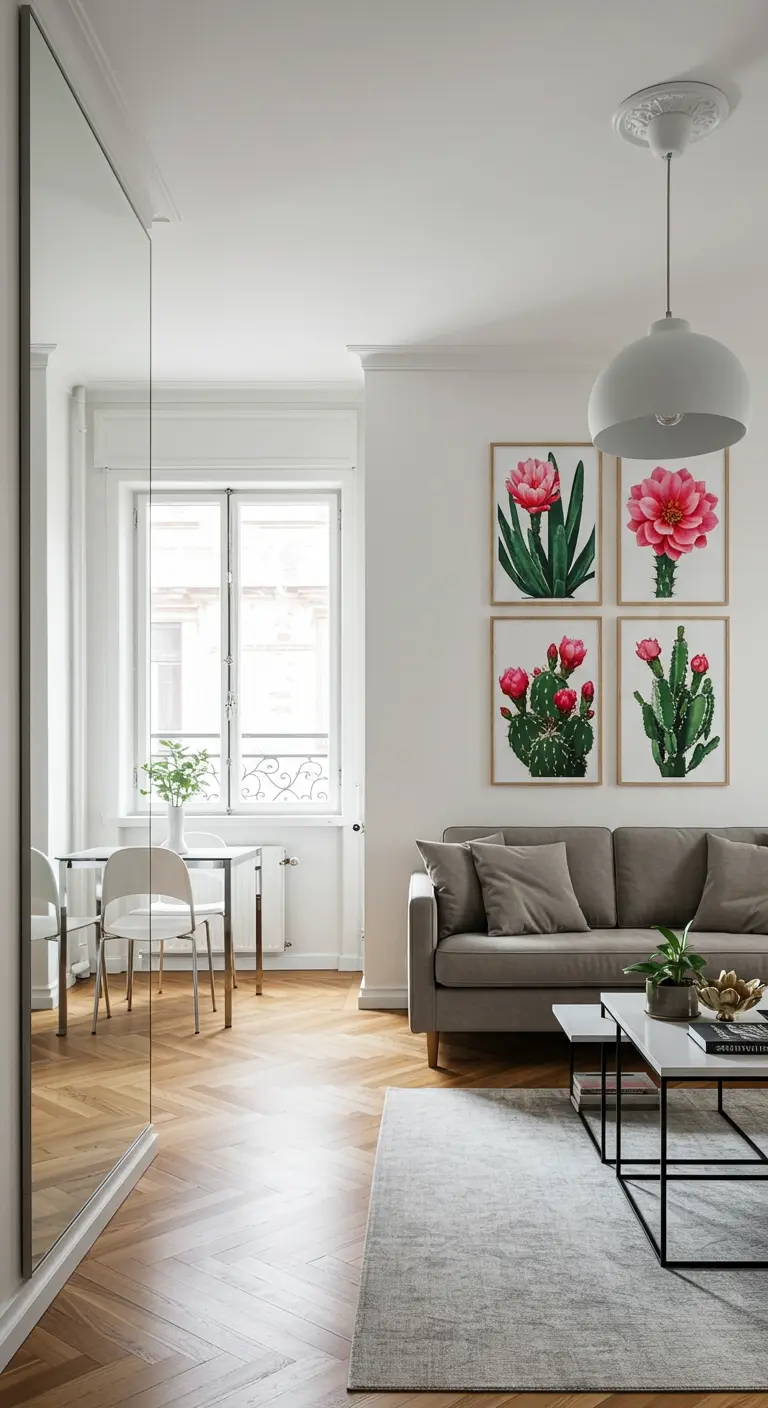
This is one of the oldest and most effective tricks in the design book for a reason: it works.
By placing a large, full-length mirror opposite your art, you not only reflect light and make the room feel twice as large, but you also get to enjoy your art from multiple angles.
The mirror reflects the cheerful cactus prints, doubling their impact and spreading their color and energy throughout the space. It’s one of the best smart mirror placements that visually expand small rooms.
27. Integrate Botanical Prints Within Your Shelving
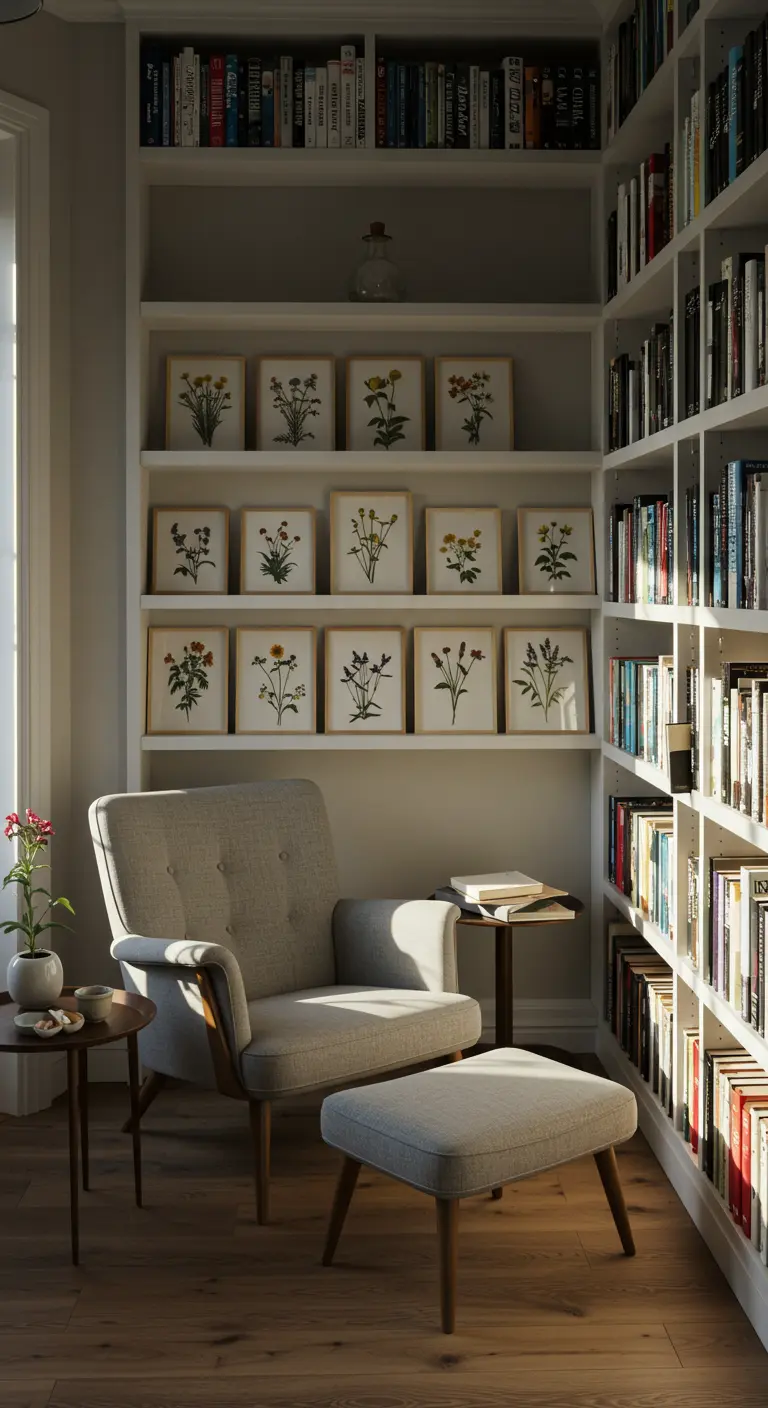
Give your bookshelves a designer touch by styling them with more than just books.
Leaning small, framed botanical prints against the back of the shelves breaks up the monotony of endless spines. It adds a layer of visual interest, depth, and personality.
This technique turns a simple storage unit into a curated display, transforming a collection of books into a true enchanted library corner.
28. Elevate a Powder Room with a Single, Serene Image
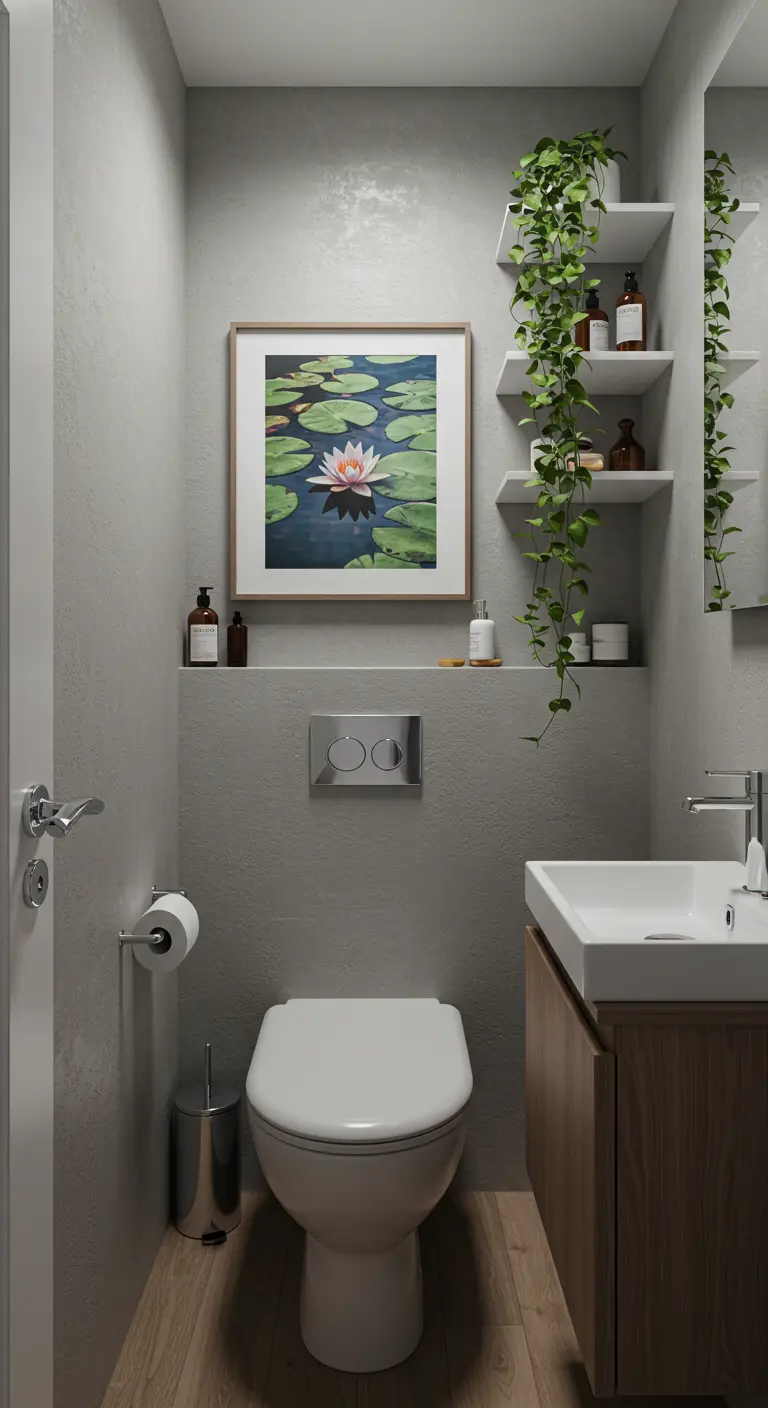
Even the most compact space, like a powder room, can become a design moment.
Instead of cluttering the small walls, choose one captivating piece of art. This photograph of a water lily on a pond sets a peaceful, meditative tone for the entire room.
Pairing it with trailing ivy on simple floating shelves enhances the vertical space and creates a tiny, jewel-box effect. This is how you create botanical sanctuary bathrooms, no matter the size.
29. Explore Nature’s Abstractions with Wood Slice Prints

Thinking ‘botanical’ doesn’t have to mean leaves and flowers. Consider the beauty in other natural forms.
A grid of prints featuring cross-sections of tree trunks offers an organic yet graphic element. The unique rings and textures in each slice are like nature’s fingerprints.
This approach is perfect for a space that blends clean lines with natural warmth, a key feature of modern rustic hybrids.
30. Embrace a Moody Palette for a Cozy Retreat
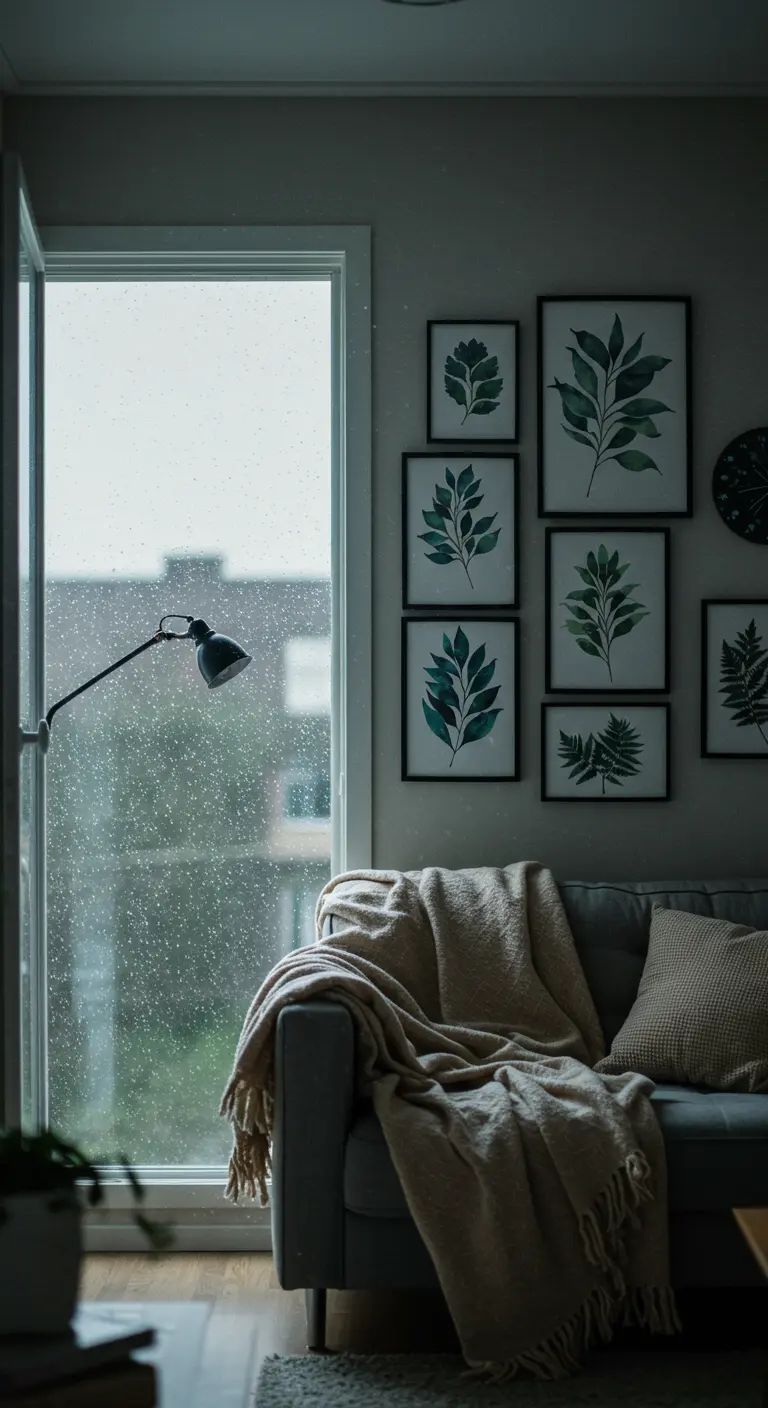
A bright and airy feel isn’t the only way to create a retreat. Sometimes, coziness comes from embracing deeper tones.
A gallery wall of botanical prints with dark, rich backgrounds creates an intimate, enveloping atmosphere, especially on a rainy day. This is perfect for a den or a corner dedicated to quiet relaxation.
Pair the dark art with soft, plush textiles like the throw blanket here to enhance the sense of comfort. It’s a key strategy for creating moody, jewel-toned schemes that feel like a hug.
